Queen Charlotte: Modernising costume drama

May 2023
RTS Cambridge Convention 2023
20 - 21 September
Chaired by:

Alex Mahon, CEO, Channel 4
Speakers include:
Mike Fries, CEO and Vice Chairman, Liberty Global Shay Segev, CEO, DAZN
Bryan Lourd, Co-Chairman, Creative Artists Agency (CAA)
Linda Yaccarino, Chairman, Global Advertising & Partnerships, NBC Universal
Debbie Weinstein, VP & MD, Google UK & Ireland
Evan Shapiro, Media Cartographer
Ajaz Ahmed, CEO, AKQA
Jordan Schwarzenberger, Co-Founder, Arcade Media, The Sidemen
Returning speakers:
Tim Davie, Director-General, BBC
Carolyn McCall, CEO, ITV
Dana Strong, Group CEO, Sky
Maria Kyriacou, President, Broadcast & Studios, International Markets, Paramount Global
Stephen van Rooyen, CEO, Sky UK & Ireland and Chief Commercial Officer, Sky Group
ROYAL TELEVISION SOCIETY
Book now: rts.org.uk
Congratulations to all the UK broadcasters that brought us such stunning pictures of the King’s coronation.
It was a triumph of technology and logistics as the TV cameras captured what was arguably the greatest royal spectacle that most of us will ever see. These era-defining images will remain long after the bunting is taken down.
About 20 million people tuned in to watch the ceremony across BBC One and Two, ITV and Sky News.
In this month’s issue, I’m delighted that departing Sky News chief, John Ryley, has written our TV Diary. Covering the coronation was John’s last act
From the CEO Contents
in an extraordinary 28-year career at Sky News. Everyone at the RTS wishes him well in the next stage of his professional life.
This month’s cover story looks at diverse casting in period drama. Shilpa Ganatra’s report makes fascinating reading, as she recounts the progress made in recent years thanks to shows such as Bridgerton and, this year alone, Queen Charlotte, Great Expectations and Tom Jones
Armando Iannucci is among those Shilpa interviewed for the piece. His phrase “universal casting” is one that deserves to resonate far and wide. It feels a more appropriate term than “colour-blind casting”.
April was a stellar month for RTS

5 6 8
John Ryley’s TV Diary
Departing Sky News chief John Ryley bows out on a high as he masterminds coverage of the King’s coronation
Comfort Classic: Queer as Folk
Matthew Bell salutes a breakthrough drama written for Channel 4 by a then largely unknown Russell T Davies
Ear Candy: Drifting Off with Joe Pera
Harry Bennett finds himself mesmerised by the languid Joe Pera and composer Ryan Dann
Working Lives: Comedy director

Rosie Gaunt-Mathieson shares her experience of directing her first sitcom, Ruby Speaking, with Matthew Bell
Period drama for modern times
Shows such as Bridgerton and the BBC’s latest version of Great Expectations are bringing fresh energy to costume drama, reports Shilpa Ganatra
Moore please!
Steve Clarke profiles the BBC’s chief content officer, Charlotte Moore, recently presented with the RTS Judges’ Award
Our Friend in Hollywood
Jonathan Shalit recalls how a trip to Tinseltown made his dream come true
National Events. The energy in the room for “The legacy of the black square” discussion was electrifying. “Game On!” was a timely exploration of what it takes to transform a video game into a hit TV series. And the RTS was thrilled to host a special evening with S4C featuring a screening of Y Sŵn (The Noise). This film tells the story of the campaign that led to the creation of the Welsh fourth channel. We also have a report in this issue of a recent RTS North West event with the creators of the glorious Inside No 9
S4C’s noisy birth

Matthew Bell talks to the makers of Y Sŵn (The Noise), S4C’s Welsh-language dramatisation of its painful gestation
‘De-grimifying’ disability
Katy Boulton celebrates the Parkinson’s podcast Movers and Shakers as the kind of engaging content that helps us all to understand disability better
Thrills, spills… and kills
RTS North West hears from the creators of BBC Two’s gloriously sinister comedy anthology Inside No 9, who explain why variety is the key to its success
Searching for the truth on political TV
Narinder Minhas savours a new book that is a love letter to the long-form interrogation of politicians by broadcasters
Legacy of the black square
Three years after the murder of George Floyd, an RTS National Event examines the impact on programming and commissioning
Game on!
Hit TV series The Last of Us is based on a video game. The RTS hears how respect and authenticity are key to a winning adaptation
3 Television www.rts.org.uk May 2023 Editor
smclarke_333@hotmail.com Production, design, advertising Gordon Jamieson gordon.jamieson.01@gmail.com © Royal Television Society 2023 The views expressed in Television are not necessarily those of the RTS. Registered Charity 313 728 RTS, 3 Dorset Rise London EC4Y 8EN T: 020 7822 2810 W: www.rts.org.uk Journal of The Royal Television Society May 2023 | Volume 60/5
Steve Clarke
22
12
16
7 20
Cover: Queen Charlotte: A Bridgerton Story (Netflix)
Theresa Wise
24 26 10 Sub-editor Linda Coffey thelindacoffey@gmail.com News editor and writer Matthew Bell bell127@btinternet.com 15 18
licensed worldwide, we’ve got the perfect soundtrack, whatever your project.
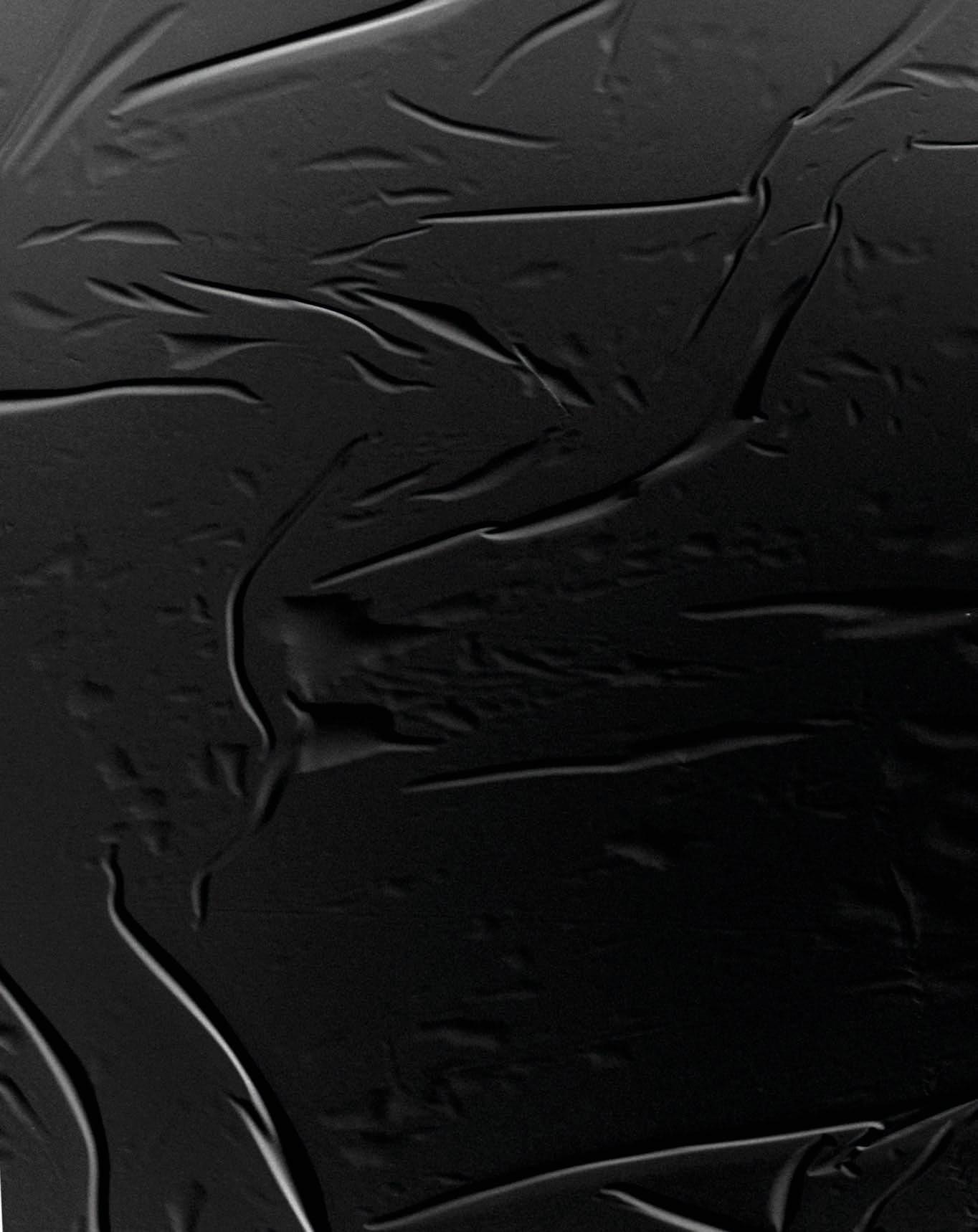
audionetwork.com/discover

SEND US YOUR BRIEF - MUSICSEARCH@AUDIONETWORK.COM
MUSIC DISCOVERY MADE SIMPLE
ALYUSHA CHAGRIN (VOCALISTUK)
TV diary
12:00 Friday 5 May
The Sky newsroom: 24 hours left as the boss; 39 years in daily news – 17 years as the head of Sky News – will come to a hard stop tomorrow at noon, when Charles is crowned King and Camilla Queen.
Standing at my desk, I look across the newsroom and reflect on how this trade has changed. Now, there are no ashtrays. No plastic cups of half-drunk coffee. No typewriters. But so many mobile phones.
I began my career as a journalist in 1984. It was the year of the miners’ strike – Britain’s most socially divisive industrial dispute for nearly six decades; a year when the IRA tried to assassinate Margaret Thatcher and her entire cabinet; a year when Britain was threatening the European Community with dire consequences if it didn’t get a better deal on its EEC budget contributions.
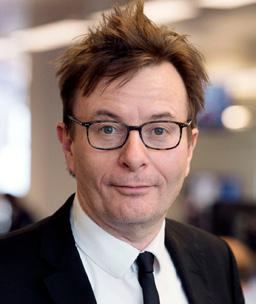
Almost 40 years on, it seems the world has not changed very much. Strikes, terrorism and Britain’s relationship with Europe still dominate the news. Except with the addition of a new, more existential threat from a dramatically changing climate.
18:00 Friday 5 May
■ The Sky car park. Local election results from England have been coming in all day. A text alert pings to report a Sky News vote share projection, which suggests that Labour would fall short of an overall majority at the next general election. The forthcoming election will be the next big set-piece news event that Sky will produce. I’ll watch it from home.
07:30 Saturday 6 May
■ The Sky newsroom. The last editorial meeting of my career. Held, as all 7:30 meetings have been over the past three years, on Teams.
I talk about the need to apply the same editorial rigour to the coronation on all our platforms as to any other story we report. I suggest there has been a shift in the public’s attitude to the monarchy – less reverential towards Charles than the late Queen and our coverage should reflect that.
Sky News, I say, should bring a more questioning, journalistic edge to its coverage than the Queen’s funeral allowed. This meeting, like all the best meetings, is swiftly over.
09:30 Saturday 6 May
■ Green Park, London. Walking through Green Park in the rain, soaking up the atmosphere, heading
for our outside broadcast (OB) truck. Lots of text messages wish good luck. Then Mark Austin calls. “Have you left the newsroom yet, John?,” he asks. I tell him I’m near Buckingham Palace. He needs someone to bring his cobalt-blue suit to our studio opposite the Palace. Once a presenter, always a presenter.
I stop to witness with my own eyes and ears the cavalry lining up outside the Palace – a rare experience after watching so many news events over the years through a multitude of monitors and sound feeds.
12:00 Saturday 6 May
■ Inside the OB truck near Buckingham Palace. Kay Burley, Anna Botting and Alastair Bruce commentate over the spectacular pictures of the event.
Sky broadcasts live pictures of the anti-monarchy protestors as the Diamond Jubilee State Coach carrying the King and Queen passes through Trafalgar Square. The BBC doesn’t.
This is a deeply religious ceremony. The music is beautiful. The fountain pen Charles uses to sign the oath doesn’t leak ink. One of my grownup daughters rings to say, “Enjoy your retirement.” She isn’t watching this ancient ritual.
I will miss the job and miss the judgement calls but, most of all, I will miss the wonderful people at Sky.
Just after noon, the jewel-encrusted St Edward’s crown is put uneasily on the King’s head. My time leading Sky News is over. I walk out of the truck and wander into the May drizzle excited by the future. That is that.
The end.
5 Television www.rts.org.uk May 2023
John Ryley bows out on a high as he masterminds Sky News’s coverage of the King’s coronation
John Ryley was head of Sky News 2006-2023.
Sky
COMFORT CLASSIC
Queer as Folk
Predictably, Fleet Street was outraged. Queer as Folk, foamed the Daily Mail, “proves that we need censorship… we shouldn’t be at liberty to watch naked actors having relentless homosexual sex”.
Some commentators in the gay press were also critical, arguing that the series should have been less celebratory and angrier about the tragedy of Aids. But, if you are being attacked from both sides, perhaps you are doing something right. Most television viewers
Matthew Bell salutes a breakthrough drama written for Channel 4 by a largely unknown Russell T Davies
and critics certainly thought so as they marvelled at Russell T Davies’s breakthrough drama series.
Queer as Folk opens with its three main characters – late-twenties best friends Stuart (Aidan Gillen) and Vince (Craig
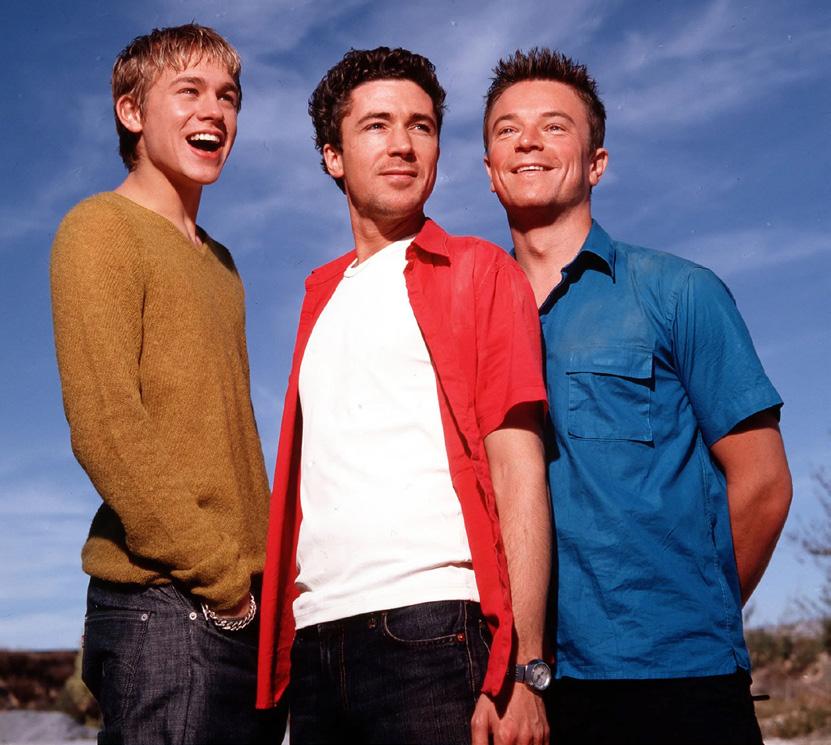
Kelly), and 15-year-old Nathan (Charlie Hunnam) – on a night out in Manchester’s vibrant gay village, Canal Street. Cocksure, reckless advertising exec Stuart lives life to the full and is used to getting what he wants. In the opening episode, when the awe-struck Nathan meets Stuart, he describes him as “looking down at me like the face of God”. Vince is more down to earth and diffident, as well as obsessed by TV and popular culture.
Davies has described his principal characters as “three versions of the same man. All of us have been those
6
Channel 4
people at one time or another.” Yet, when we see Vince alone, late at night, watching an old VHS tape of Tom Baker-era Doctor Who, one cannot help wondering whether he is the closest approximation of the show’s creator.
Channel 4 and executive producer Nicola Shindler (Queer as Folk was the first project of her new indie, Red Production Company) were taking a huge risk on Davies, who until then had mainly worked in children’s television, and on the drama’s subject matter.
In 1999, when the series came out, the repressive Section 28 legislation that banned the promotion or mention of homosexuality by local authorities was in force. Overall, Britain was not as liberal then: attitude surveys showed that half the country thought gay relationships were always or mostly wrong.
For Channel 4 to invest a reported £3m in the eight-part series was a brave decision, but one that was entirely vindicated. A second and final two-part series was broadcast the following year.
Almost 25 years later, Queer as Folk still feels remarkably fresh. The series is euphoric, outrageous and lifeaffirming, but also, at times, melancholic and heart-rending. More than anything, it’s chock-full of humanity and, therefore, trademark Davies.
Gay relationships in TV drama are now common enough that they don’t generate news; if anything, a show is more likely to be remarked on for being too straight.
There is, though, one scene in Queer as Folk that jars, and which almost certainly wouldn’t make the cut today: the sex between Stuart and under-age Nathan is portrayed as a joyful, comingof-age event, but would nowadays be regarded as sexual abuse.
Once the bogeyman of the Mail, Davies has become a national treasure, the man who brought back Doctor Who, bigger and better than before, and is now coming to its rescue again. The BBC sci-fi classic, in its 60th year, returns in November with Davies back on board as showrunner. After Queer as Folk, Davies went on to pen awardwinning dramas such as Bob & Rose, The Second Coming and A Very English Scandal
And, finally, he wrote his Aids drama, the astonishing It’s a Sin. Like Queer as Folk, it was celebratory but, this time, Davies didn’t flinch from showing the prejudice of the time and the horrors of the hospital wards. ■
Queer as Folk is available on All 4.
Ear candy
Joe Pera is a walking, talking anachronism. Languid in speech and manner, with a keen eye for the small wonders of life, he resembles an old preacher more than a young comedian.
In the Adult Swim channel comedy Joe Pera Talks with You, he starred as a semi-fictionalised version of himself, living in smalltown Michigan and talking us through his favourite, ostensibly mundane, subjects.
It was, for many, a beacon of calm in a world spinning far too fast, and they were devastated by the news of its cancellation in 2022.
Thankfully, Pera’s new podcast, Drifting Off with Joe Pera, has picked up where the previous show left off. There is no narrative this time, just a loose theme for each 20-minute episode, but his bountiful positivity and dulcet tones remain a good alternative to ASMR for anyone like me who finds the latter creepy rather than relaxing.
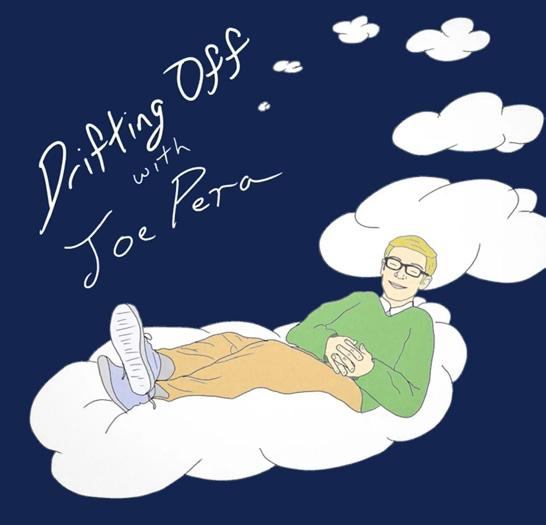
So far, Pera has waxed lyrical about
soup, clock chimes and video games, with the help of some friends who call in at various points for relaxed conversations and gentle banter. Their words rest on the soft ambient soundscapes of his trusty composer, Ryan Dann. Episode 3, the one on video games, is the best yet, but it is not possible to do it justice here. I will just say that Pera segues back and forth between his memory of an airport shuttle bus he once took in Arizona, and a conversation about the Wild West video game Red Dead Redemption 2 with one of its voice actors, Roger Clark. It is a moving meditation on loss, fate, the life-affirming power of sunrises and the perspective-altering power of video games.
The one downside is the monthlong gap between episodes. But, if anything, the wait only heightens the sense you get of the deep care that Pera and Dann take as they slowly carve out another oasis in the endless tsunami of slapdash content. ■
Harry Bennett
7 Television www.rts.org.uk May 2023
Chestnut Walnut
WORKING LIVES
Comedy director
Rosie Gaunt-Mathieson has directed her first series, the new ITVX sitcom Ruby Speaking, starring Jayde Adams, a fellow Bristolian. It is not her first directing landmark: that came with the RTS award-winning student film Tea and Charity, while she was at Bournemouth University.
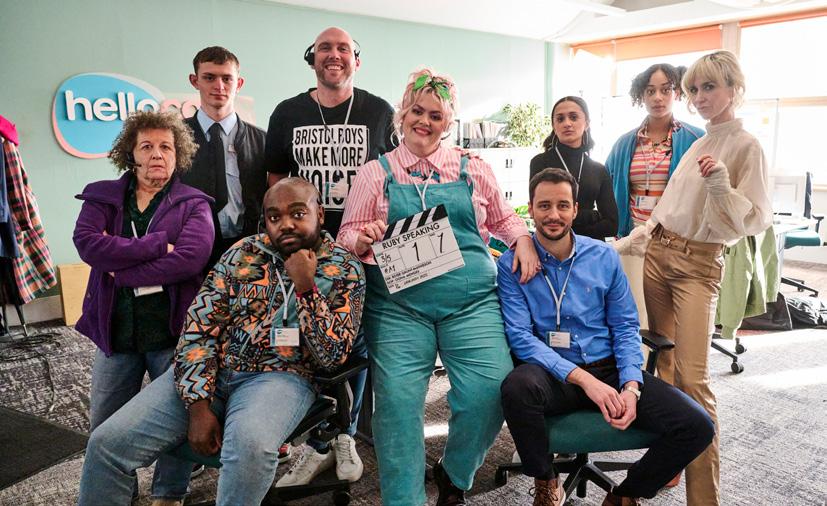
What does the job involve?
Directing narrative is a unique and wonderful labour of love, and to build worlds and realise characters on screen is a great responsibility. It’s piecing together a jigsaw of story, character, location, design and tone, often under pressure and fuelled by coffee. You need to be definitive, clear and strongheaded; you want your audience to buy into your characters on their journey – whether that’s about love or survival.
And when it comes to comedy?
As a director, you have to understand what is funny about the script and how best to interpret that. I’m obsessed with the rhythm of comedy and making sure I’ve got the build-up and the punchline. Light and shade is
important – comedy needs space and quieter moments to make the funny moments sing.
Casting is so important: great actors inhabit the role and it’s important they understand comedy.
What makes a good director?
You have to be emotionally intelligent to be able to read your performers and understand what they need from you. It is important to have a strong vision and to be a good listener and collaborative as a director – performers need to feel they are working in a safe space. The most magical things happen when you’re working in a collective environment.
How much technical knowledge do you need?
I’m not very technical. When I started out, I thought I needed to swot up on camera lingo and lens sizes, but I’ve realised that all I need are really great heads of department with whom I have a shorthand.
I’m technically better with scripts and storytelling structure than equipment, which comes from years working in
development, script editing and writing (which I do occasionally, too).
Ruby Speaking is your first series –was that daunting?
I’ve known Jayde [Adams] for a long time, since we did theatre studies in sixth form in Bristol and we have worked together on several things.
With Jayde, Abigail Wilson’s writing and the fact that it’s set in Bristol and in a call centre (I worked in a car insurance call centre in Bristol after my A-levels and we dicked about like they do on Ruby Speaking), it couldn’t have felt a more right or serendipitous project.
Bristol is my hometown and, when I got the script, I connected with it more than anything I’ve ever been sent. So, it was daunting in scale, but so very right.
How are you feeling ahead of transmission?
I feel good about it. I’d be lying if I said I wasn’t full of nervous anticipation (it’s six months of extremely hard and personal work), but I think we made a series that will provide a fun escape and does a great job of portraying a work family.
8
ITVX
Ruby Speaking star Jayde Adams (centre)
I felt very connected with the show’s characters and comedic tone, which is quite offbeat and heartfelt. It also has some beautiful pathos and important things to say about loneliness and female empowerment.
What was your route into directing?
I took Bournemouth University’s TV production degree and my graduate showpiece, a comedy called Tea and Charity, which I wrote and directed, and won an RTS Southern student drama award.
At that time, there were not many women directing and I defaulted towards producing: directing never felt like a real option.
I started work as a production co-ordinator, booking cabs and doing call sheets and budgets.
I then wrote and produced some sketches as a means of getting into producing and [former BBC and Sky comedy boss] Lucy Lumsden, whom I’m working with now at Yellow Door Productions, where she is MD, said: “I bet you could have directed those.” It was a bit of a moment for me. She may not know this, but it did trigger a big shift – that and the fact there weren’t many women directing; I decided to be the change I wanted to see.
Is that when you made the leap into directing?
It took a few years. I worked in developing scripts and pitching ideas as a development producer, and then I ran two development departments [at ABC International and Little Dot].
Development can feel like having your heart repeatedly broken. When my husband and I found ourselves in a more stable financial situation, I left my full-time job and threw myself into freelance directing. It was intimidating to start with, and worrying when Covid hit, as we are both freelancers.
Grief and anticipatory grief has also been a catalyst: I lost my dad in 2019 and my mum while in prep on Ruby Both of them had long, progressive illnesses that dominated most of my twenties and thirties. They both had different and mad sense of humours,
which certainly influenced my humour and work.
When the worst things happen to you, such as losing family, it makes you evaluate everything. Losing both parents close together when I was
What are the best and worst parts of the job?
It’s a privilege to bring a world of characters to life, to be part of the energy on set and to work with amazingly creative people. The hardest thing is trying to maintain self-care and family life, because the job is all-consuming; family, friends and fellow director peers are a great support when it feels more isolated.
Are there any tricks of the trade you can share?
I often get actors to improvise feed lines before the scripted lines and leave the camera running longer because sometimes you get gold-dust moments of performance or extra beats, especially when you’re working with strong comedy performers.
What advice would you give to someone wanting to direct?
quite young forced an independence, drive and bravery in me that I think goes hand in hand with directing.
What were the first programmes you directed?
I did a lot of commercials, sketches for Channel 4 show Big Juice, some branded content and Dawn of a New Gay, a short film with [Big Boys creator] Jack Rooke, which did well on the festival circuit.
I then got funding for another short, Just Delivered, which won an Audience Award at the Calgary International Film Festival. I directed two episodes of a kids series last summer for the BBC. It was hard to get those first gigs but people knew me from my years in the comedy world, which helped.
What do you take with you on to set? A hat because my hair is a mess when I’m filming. Marked-up scripts with shot lists and blocking notes. My phone, which is useful for angles and framing, and to show mocked-up edits. Everything I own has a brightly coloured case so it’s easy to find when I’ve mislaid it on set for the 100th time.
Make things (shorts/micro shorts) and find your voice as a director. Shadow other directors. Know that, while a lot of the job is talent, a lot of it is about how well you work with people. Find your tribe of crew who will move up with you. Remember, when you are hired, you are a creative and not an artist: you have commissioners, other creatives, clients, a budget and schedule to answer to.
Is it harder for a woman to make it as a director?
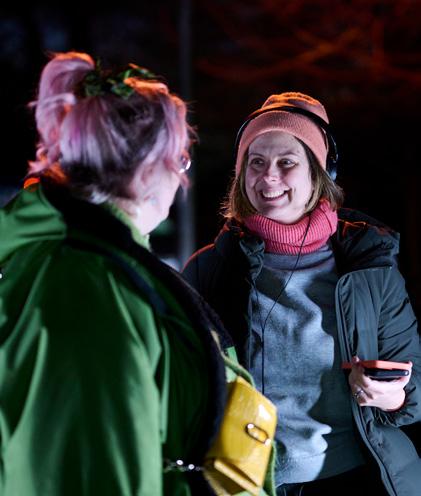
Change is happening: it’s a really exciting time as a female director in TV, though the commercials industry needs to get a grip and catch up – it’s still very male and feels boringly tokenistic towards female directors. I had female directors shadowing me on the Ruby Speaking set. I have a mentor now – Jim Archer, who directed Big Boys and the comedy feature Brian and Charles
What else would you love to work on?
Comedy and characterful drama is where my heart is, [but] I’d love the challenge of making something mad about mermaids. ■
9 Television www.rts.org.uk May 2023
ITVX
Rosie Gaunt-Mathieson was interviewed by Matthew Bell. Ruby Speaking will stream on ITVX from 8 June.
Rosie Gaunt-Mathieson (right) on the set of Ruby Speaking
Period drama for modern times
In 2015, David Oyelowo, who played Martin Luther King in the film Selma and starred in BBC One’s Spooks, highlighted the lack of on-screen opportunities for people of colour in British period dramas.
“We make period dramas, but there are almost never black people in them, even though we’ve been on these shores for hundreds of years,” he told Radio Times. “We don’t get [to star in] Downton Abbey or Call the Midwife or Peaky Blinders or the 50th iteration of Pride and Prejudice. It’s frustrating because it doesn’t have to be that way.”
It is a sign of progress that, three years later, he won a high-profile role in Andrew Davies’s adaptation of Les Misérables for the BBC. But could the Oyelowo of 2015 have imagined that, eight years on, one of the most impactful TV series being streamed would put people of colour front and centre, in the background and behind the camera: Netflix’s Bridgerton
The producer is Shondaland, set up by Shonda Rhimes, the US screenwriter famous for Grey’s Anatomy. Shondaland’s
new spin-off series, Queen Charlotte: A Bridgerton Story, builds on its predecessors’ contemporary take on Regency London. It tells the origin story of its eponymous heroine, played by India Amarteifio (Sex Education, Line of Duty).
In the series, she grapples with her new royal position, befriending a young Lady Danbury (Arsema Thomas) in the process. Her ethnicity is no accident: it stems from the historians who believe the real-life Queen Charlotte was descended from a black branch of the Portuguese royal family. The theory has been called into question, but why let the truth get in the way of a good story?
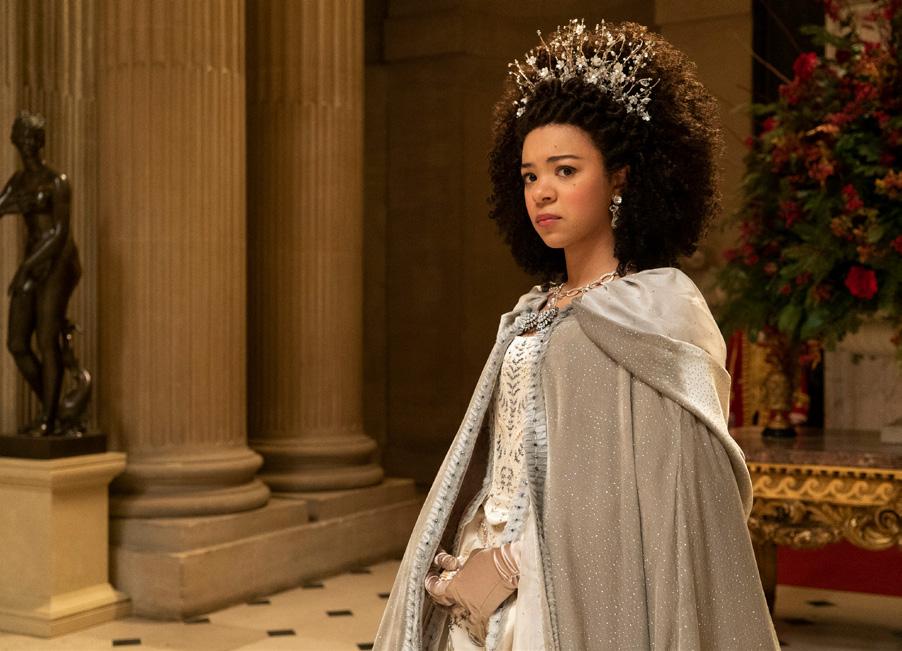
Casting director Kelly Valentine Hendry (Gangs of London, which earned her an RTS award nomination, Fleabag, Broadchurch) worked on all three iterations of the franchise – series 1 and 2 of Bridgerton and Queen Charlotte
Casting the new show was “almost too easy” because she wasn’t required to enlist a recognised name in a lead role. She could hire on merit alone.
“On top of that, being able to look for actors who are in their early twenties is a joy, because you can tap into new
10
Shows such as Bridgerton and the BBC’s latest Great Expectations are bringing fresh energy to costume drama, reports Shilpa Ganatra
‘WANT TO BE HISTORICALLY ACCURATE?
ALL THE CHARACTERS SHOULD HAVE TERRIBLE TEETH’
Netflix
India Amarteifio in the title role in Netflix’s 2023 Queen Charlotte: A Bridgerton Story
actors. India already had a body of work behind her, but Arsema was straight out of drama school.”
Hendry adds: “The great thing about this team is that we never needed to be briefed on diversity and inclusion. With Shondaland and Netflix, it goes without saying because people of colour are at the heart of the decisionmaking process. It’s a problem when we have tables of white people having discussions about diversity. I’m glad we’re having those discussions, but they are quite often had with nobody at that table who has the lived experience.”
Bridgerton’s arrival in 2020 came just as TV period drama was slowly embracing actors of colour. Cole Edwards, the co-casting director who worked alongside Hendry on Queen Charlotte, recalls: “When I started casting five years ago, diversity meant, ‘Let’s make the postman black.’”
Queen Charlotte is the latest in a small but significant number of period dramas featuring non-white leads. Armando Iannucci made headlines when he cast Dev Patel (Slumdog Millionaire, Lion) in the title role of The Personal History of David Copperfield, the 2019 feature film based on Charles Dickens’ novel.
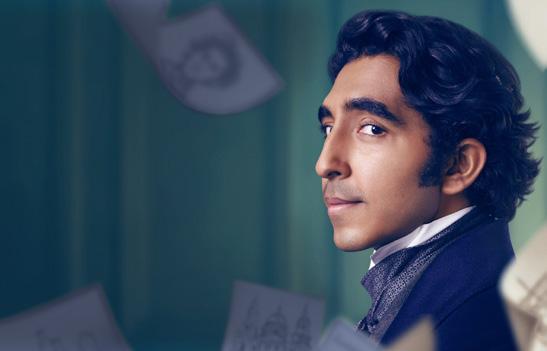
Additionally, Channel 5’s Anne Boleyn cast a non-white actor (Jodie TurnerSmith) as the short-lived Tudor queen. More recently, Steven Knight’s controversial reboot of Great Expectations for BBC One also used colour-blind casting. Both Estella and Jaggers were played by black actors. ITVX is currently airing Tom Jones, with the Australian-Ivorian Sophie Wilde as Jones’s love interest.
It is notable that compared with other genres, be it sci-fi or soaps, period drama has been slow to reflect Britain’s ethnic make-up. This is a problem, given the amount of British period drama and the prestige that it carries globally.
Hendry says: “We are fantastic at period dramas. We hold on to our history so much. But that means the rewriting of any British history doesn’t go down very well with a lot of people. And, because so many people have access to television, they feel that they own it slightly and want their story to be portrayed. It’s taking a bit of time for people to realise that there are other types of people in the world.”
For Iannucci, removing racial barriers for The Personal History of David Copperfield was a no-brainer, especially after he brought Patel on board
following his Oscar-nominated performance in Lion. The film also featured families of different ethnicities: there was Mr Wickfield (Benedict Wong) and his daughter Agnes (Rosalind Eleazar), and Steerforth (Aneurin Barnard) and his mother (Nikki Amuka-Bird).
“I know the term is ‘colour blind casting’,” says Iannucci. “But that is strange to me because it sounds restrictive. It’s universal casting. Why should I not be allowed to draw from 100% of the acting talent available to me?
“In the last five or 10 years, there’s a
for the Children’s Media Foundation, “The appeal of period drama for a younger audience”, Dr Shelley Anne Galpin said: “A sensitivity towards issues of diversity and minority representation, and an appreciation for characters who embodied the struggles of the disadvantaged, was a frequent feature of the responses given by participants in my research”.
Other modern-day shifts might also include changes in pace, characters’ attitudes, representations of women, sexuality, colonialism and slavery.
whole new generation of actors coming out of drama schools who are exciting and sharp and committed. We shouldn’t be saying to them, ‘The bulk of our industry is going to be making dramas from which you are excluded for historic reasons.’”
The idea of staying historically accurate isn’t enough of a reason to restrict casting choices. “If you wanted to be historically accurate, all the characters would have terrible teeth,” he says. “The whole thing is artifice. It’s about how emotionally accurate it is, what the story is that you want to tell, and the best way of telling it.”
Hendry agrees. “The Bridgerton world shows a reimagined version of history, and so what? It’s great fun, and it’s a way to allow more people to enjoy it. Storytelling should be available for everyone, no questions asked.” This is an important point. Regardless of one’s personal feelings on the subject, racial diversity is part of a broader set of updates appropriate for a present-day audience – not least the sought-after under-35s.
This is backed by academic research as much as viewing figures: in a paper
While ensuring that steps have been made regarding diversity in period drama, there remain areas of oversight. There is the issue of greater discrimination towards darker-skinned black and brown people. Hendry notes, too, that Chinese actors are still underrepresented, as are people with disabilities.
Happily, open searches – where the net is cast wider than those actors who have agents – are increasingly common. This helps to remove many of the systemic barriers that often limit the diversity of the auditioning pool. We might also dig deeper into the nature of the diversity. Perhaps stereotypical roles – casting a black person as a maid, for example – do more harm than good.
Thanks to the screen industries drawing from a wider range of writers, producers and commissioners, change is coming naturally. Compared with Oyelowo’s experience eight years ago, it seems that all-white period dramas are becoming a thing of the past. ■
11 Television www.rts.org.uk May 2023
Lionsgate
Queen Charlotte: A Bridgerton Story is available on Netflix.
Dev Patel in the 2019 film The Personal History of David Copperfield
‘UNIVERSAL CASTING: WHY SHOULD I NOT BE ALLOWED TO DRAW FROM 100% OF THE ACTING TALENT AVAILABLE TO ME?’
ARMANDO IANNUCCI
It is rare for the BBC not to be in the crosshairs of a crisis and 2023 has been no exception. Behind the headlines, though, the opening months of the year have been a time of triumph for its creative chief, Charlotte Moore. The BBC has dominated the TV awards season. At the RTS Programme Awards, the corporation pocketed 17 out of a total of 30 awards.
Across scripted and unscripted, TV and radio, reviewers agreed that, of late, the Beeb has consistently hit the high notes with shows such as This Is Going to Hurt, The Gold, Blue Lights, Chris Packham’s Inside Our Autistic Minds, The Traitors and The Coming Storm
For Moore, the icing on the cake was receiving the RTS Judges’ Award in recognition of having led the corporation “through one of the most momentous years in its history [and having] done so with an exceptional combination of steadfast level-headedness, confidence and creative flair”.
The citation added: “Charlotte’s been an outstanding leader for the BBC’s content. She’s championed it, defended it, pushed it to be the best it can be. And while doing that, she has remained approachable and accessible… always keen to find the next show that will resonate with viewers, always determined to make the next turn of the wheel.”
For such a powerful BBC executive, Moore tends to avoid the public gaze, generally limiting herself to a couple of high-profile industry speeches a year. She is not a regular attender at awards ceremonies.
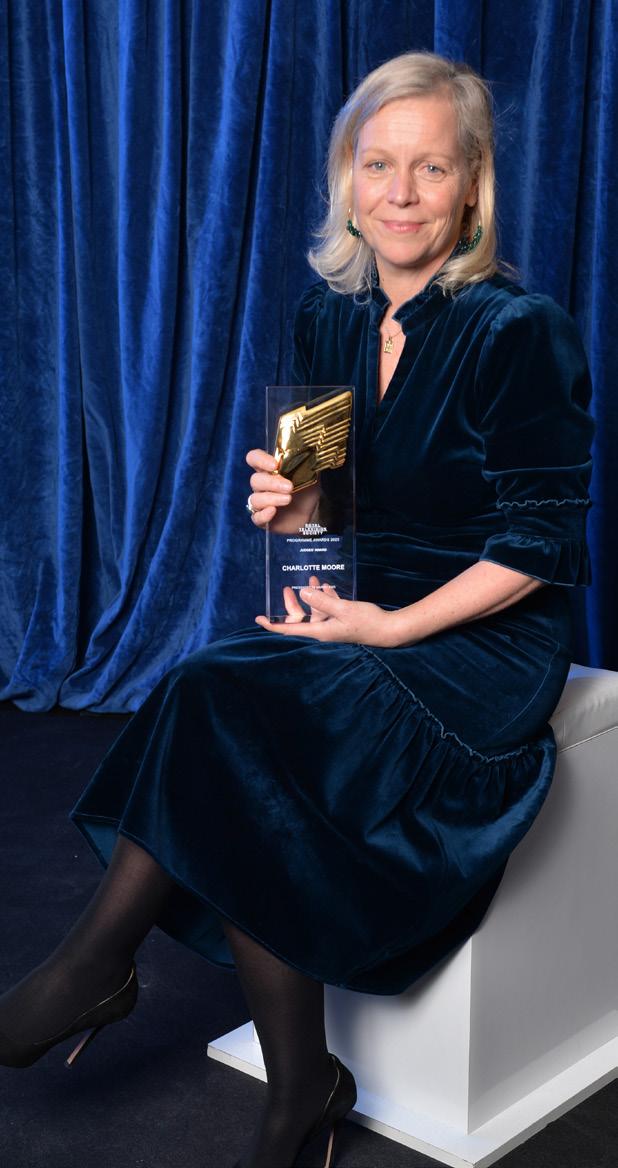
That could be about to change. Last month, she threw herself into the lion’s den by agreeing to answer questions at a lunch hosted by the Broadcasting Press Guild. A wide range of media journalists attended. BBC sceptics the Daily Mail and The Daily Telegraph were there, as was Television. This week, she will give a talk at the Voice of the Listener and Viewer’s Spring Conference.
Guiding the overall creative and editorial strategy of a behemoth such as the BBC is fraught with dangers. To do so during these fractious times makes the job more challenging still. Moore, though, appears to have risen to the task with a combination of resolve – those who know her attest to her steeliness – and the ability to work consensually and collaboratively in what can be a divisive workplace.
As one senior broadcaster says: “The BBC is facing challenges on several
Moore please!
12
Steve Clarke profiles the BBC’s chief content officer, Charlotte Moore, recently presented with the RTS Judges’ Award
Richard Kendal
fronts, not least a revolution in the way that content is being consumed. But across the genres – in TV and radio – few could deny that it’s performing well. And this is despite the Tory Government putting the BBC on a diet.”

Andy Harries, who runs Left Bank, producer of The Crown, says of Moore: “Charlotte is very user friendly, with broad taste, is smart and calm, and tries hard to surprise and excite people with her appointments.” For example, appointing Lindsay Salt as director of drama, he says, “was bold and bucked expectations”.
Her brief is, to put it simply, allencompassing. Here is the official summary of the chief content officer’s responsibilities: “She oversees commissioning for all the national TV channels and BBC iPlayer, as well as commissioning and production for all 10 national radio networks and for BBC Sounds. She also oversees commissioning and production for all children’s and education content. The
role is the creative lead for all of the BBC’s key genres and portfolios.” For good measure, Moore also oversees the under-rated BBC Films.
At the Broadcasting Press Guild lunch, asked by Television how she approached such a big job, she said: “You obviously need to have a good team and people who know what they are doing. Also, I’m not an expert in every area. I have to think about how I can add value and… about
what I can bring with the experience of seeing it as a whole, at that macro level which helps make what [the commissioners] are doing more meaningful.
“A lot of my job is about helping to make those connections and thinking on behalf of the audience. How does the audience know we’ve got all this? You can’t expect them to navigate their way through the BBC and listen and watch it all. It’s hard enough for you. Imagine what it’s like for the audience. Part of my job is to try to pull that together.”
She added: “My job is to have a creative vision for the next two or three years. While I know what’s happening this year, right now I am in next year or the year after.
“I’m trying to build the bones of the mix of what we’re doing. Then I’ll go and talk to radio and say: ‘Oh, Mo [BBC Radio’s director of speech, Mohit Bakaya), what have you got?’ Or how can I bring classical music into such ▶
13 Television www.rts.org.uk May 2023
‘CHARLOTTE HAS BEEN AN OUTSTANDING LEADER FOR BBC CONTENT. SHE’S… PUSHED IT TO BE THE BEST IT CAN BE’
The Traitors BBC
▶ and such a project? It’s part of the glory of working for the BBC. My job is to try to make those connections and think: ‘How do I tell the creative story across a year?’
“I spend a lot of my time trying to navigate my way through that and then my team will do the actual commissioning. But I will read most of the [scripts] when we make decisions about which scripts, not because Lindsay [Salt] can’t make her own decisions, but because I need to understand what the mix is that I need to think about.
“I wouldn’t want five Grenfell projects all coming at once. I need to understand what we’re doing and how we’re doing it.
“It is a large brief. When I was asked to do it, I did think, ‘How on earth am I going to do that?’ But, if I hadn’t done my previous job [director of content], I wouldn’t have been able to do it.… I’ve taken a more macro view and therefore empowered people working with me to get on with their jobs.”
Moore is more than two years into the job, having been appointed in September 2020. She joined the BBC in 2006 as a documentary commissioner following a spell working as an independent. “When I first met her, she struck me as a hard-nosed documentary- maker,” says one producer. Moore read history at Bristol University after attending Wycombe
Abbey, an independent girls’ school in Buckinghamshire.
At the Scottish company, Ideal World Productions, she attracted attention for such documentaries as the RTS award-winning Living with Cancer and Great Britons: Churchill. She was promoted to head of documentaries at Ideal World before joining IWC Media as head of factual.
Her rise through the ranks at the BBC was impressive. By 2009, she
being selected as BBC One controller in June that year, only the third woman to land what was then regarded as one of the key editorial jobs in the BBC. Her hits included The Night Manager, Doctor Foster, Peter Kay’s Car Share, and The Great British Bake Off, with the 2016 final of the latter attracting more than 14 million viewers.
When, in 2016, the then-DirectorGeneral Tony Hall decided to abolish the controllerships of BBC One and Two as part of an efficiency drive – these posts had existed for half a century – the unflappable Moore was put in charge of all broadcast channels and added the highly regarded iPlayer to her responsibilities.
was commissioning editor for documentaries, where she won a reputation for favouring what were described as “clever, authored pieces”, such as the controversial documentary on euthanasia, Terry Pratchett: Choosing to Die, although her department also ordered such hits as The Great British Bake Off and The Choir
In 2013, she spent a few months as acting controller of daytime before
The erstwhile documentary-maker was destined to rise further still; later in 2016, she became the BBC’s first director of content. She was shortlisted to succeed Hall in 2020, but lost out to Tim Davie. Significantly, one of Davie’s first appointments was to make her chief content officer. There may have been a misstep in deciding to bring back BBC Three as a linear channel. The jury is till out on that decision.
Should Moore’s current winning form continue, a second stab at the director-generalship could make Moore the first woman ever to run the BBC. Inevitably, this question came up at the recent BPG lunch, but the content supremo adroitly sidestepped it. ■

14
‘CHARLOTTE IS VERY USER FRIENDLY, HAS BROAD TASTE… AND TRIES TO SURPRISE AND EXCITE WITH HER APPOINTMENTS’
The Gold BBC
HOLLYWOOD OUR FRIEND IN
Hollywood has provided me with truly memorable moments: drinking tea with Prince and Mariah Carey after the 2007 Grammy Awards; having breakfast with Danny DeVito and Charlotte Church in 1999, the year she had two double platinum CDs in the US; and lunching with Dame Joan Collins at the Beverly Hills Hotel Polo Lounge.

Then there was being guided round a Hollywood studio by Mel Brooks; seeking bootleg CDs with Island Records founder Chris Blackwell in Venice Market stalls; and celebrating my good friend Simon Cowell being honoured with a star on the Hollywood Walk of Fame.
I write from my suite high up at The Four Seasons, with stunning views towards the Hollywood sign and surrounding hills. This week, I am in LA to showcase our latest young talent, Caity Baser, the 20-year-old Brighton-based singer-songwriter named by Rolling Stone as “one to watch” for 2023.
Hollywood truly remains a city where dreams can be achieved. It is still the greatest platform in the world for people to showcase their talents and skills. As the global hub of the film, TV and music industries, it is where many of the world’s most celebrated actors, directors and producers make their names. It is equally renowned for its fashion and art scenes, and is a city of innovation and technology.
Travelling back and forth from InterTalent HQ in London’s Soho to Los Angeles has enabled me to understand the differences between the two entertainment capitals.
I find Americans more outwardly positive, excited to back ideas and less cynical than Brits. They think bigger and more ambitiously. However, they are quicker to drop someone if things are not going well.
Brits are more cautious, often over-analyse and can take longer to make decisions. But, maybe, the UK is sometimes better at giving people a second chance or even a longer run at the first one.
The importance of writers is self-evident – 11,500 are now on strike in the US. The breakdown in negotiations was primarily over pay for streaming shows. The streamers will now potentially struggle with a lack of ready-to-air drama to feed to their subscribers.
The first to feel the impact of scriptwriters downing pens will be latenight talk shows, such as NBC’s The Tonight Show Starring Jimmy Fallon and ABC’s Jimmy Kimmel Live!, both heavily dependent on sharp, edgy currentevents-based comedy writing.
The impact of the strike on scripted series will take far longer to be felt. Even daily soap operas tend to have scripts completed many months in advance. Production on finished screenplays can proceed as planned, without the benefit of last-minute rewrites.
Yesterday, I visited the Four Seasons gym, where 5ft 7in me was working out next to the 6ft 6in-plus Phoenix Suns NBA team before their game against the LA Lakers.
I always find this gym a little surreal. I have previously worked out next to a super-fit Sir Paul McCartney, then 80 years old. We talked about Paul’s former producer Sir George “Beatles” Martin, with whom I recorded Elton John, Sting and Cher. Also in those gym sessions was Jon Bon Jovi, with whom I shared an elevator months later, when he coolly took a puff on my then girlfriend’s cigarette.
I shall never forget how Hollywood inspired me to make my own dream come true, for it was here that I made the greatest decision of my life. I was driving down Sunset Boulevard with Myleene Klass, my client at the time. We were on our way to see Disney after she had hosted I’m a Celebrity... Get Me Out of Here! on NBC. This was when I had an epiphany: I decided to marry Katrina, who is now my wife. ■
Professor Jonathan Shalit OBE is a British talent manager and Chair of the InterTalent Rights Group.
15 Television www.rts.org.uk May 2023
Television’s own mover and shaker, Jonathan Shalit, recalls how a trip to Tinseltown made his dream come true
InterTalent Rights Group
S4C’s noisy birth
elsh language channel S4C turned 40 in November but, as a new film commissioned to celebrate its birthday reminds us, it almost didn’t draw its first breath.
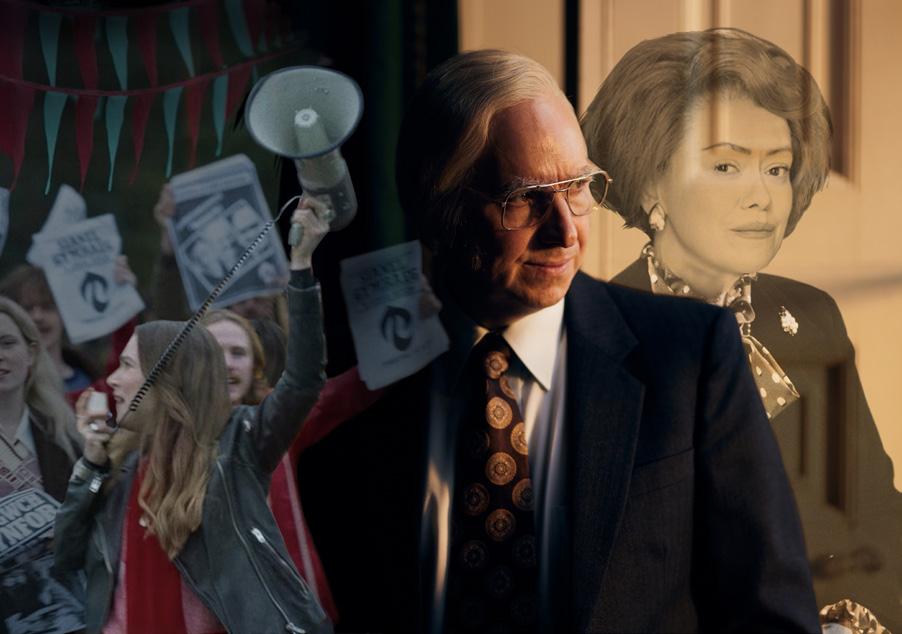
Y Sŵn (The Noise) tells the story of how the Conservative Government reneged on its 1979 manifesto pledge to introduce a Welsh-only channel and then – no spoiler alert needed – caved in.
“We wanted to do something special to commemorate our 40th birthday and decided to tell how S4C came together,” explains Gwenllian Gravelle, S4C head of scripted. “But we didn’t want to make something that was looking backwards… it’s about the past, but also looking forward to the future. We wanted to make something with a contemporary spin on a really important story for Wales.”
Director Lee Haven Jones and writer/ producer Roger Williams, armed with their own production company, Joio, have worked together for many years
WMatthew Bell talks to the makers of Y Sŵn (The Noise), S4C’s Welsh-language dramatisation of its painful gestation
– notably on S4C crime drama Bang and, most recently, the award-winning Welsh-language horror film The Feast
The latter is proof – as Squid Game demonstrates on television – that nonEnglish-language films can make their mark worldwide.
WiIliams reckons that, over the past 10 years, audience resistance to subtitles has weakened. A decade ago, no one would have believed that the Korean-language series Squid Game “would have millions and millions of people watching it around the world”.
“Cultural specificity”, he adds, is “incredibly important. We need to be brave… and not try to imitate what
other people have done. There is an appetite for distinctive voices, telling stories that haven’t been told before.”
While taking The Feast around international film festivals, says Haven Jones, “it became apparent to me that, if we are to succeed in the Welsh language, then we need to make [content] that feels different to Anglo-American stuff. Otherwise, we’re just replicating stuff, but on smaller budgets.
“Rather than doing what British TV does well, which is using [Ken] Loachian social-realism, let’s make something else that feels heightened and different…. That was the key to making Y Sŵn.”
The story of the difficult birth of S4C, he says, is “still fascinating today. It was gifted to Wales by a Tory Government and here we are, 40 years later, with a Tory Government that could quite easily decide to bring it to an end. If we don’t want that to happen, I think we have to start making content that is unique and distinctive, and not generic.”
Williams rigorously researched the programme, talking to many of the key people involved at the time, but the
16
S4C
Gwynfor Evans (played by Rhodri Evan) in Y Sŵn
truth was slippery. Haven Jones recalls a conversation in which Williams told him: “Nobody can agree on what actually happened.”
This lack of clarity was liberating for a creative film-maker. Y Sŵn begins with a quote from the Welsh poet R Williams Parry, which translates as, “Nearer the truth than the historian is the dramatist with all his fictions,” and carries on from there. As the director cheerfully admits: “There is no such thing as objective truth, so let’s make it up. It’s my job as a director of fiction.”
The film is Williams and Haven
and whose colours are firmly nailed to the Welsh mast.
Reese-Williams admits that the role of Thatcher was one “I never really expected to be doing, especially as a Welsh actor”, but that it was “a good laugh doing it”.
“Lee and I had a conversation before I started filming about the tone and how he wasn’t really interested in a true representation of the person; it was more about the spirit and the essence of the person. He said to me, ‘The reason I want you to do it is we need somebody with balls.’ I thought,
pop band Y Trwynau Coch, through 1990s Cool Cymru stars Catatonia to current Welsh-language indie rock group Adwaith.
Y Sŵn had a two-week run in cinemas in March in Wales and beyond, a premiere on S4C and is now on BBC iPlayer. “The reception has been fantastic. The people who were involved at the time are really pleased with the way it’s been portrayed and… [younger viewers] can’t believe the passion of the people who tried to start this channel,” says S4C’s Gravelle.
Welsh-language television is arguably
Jones’s version of the story, but it is essentially accurate. The duo developed a structure to tell what the director says is “quite a complex narrative”, but in an “entertaining, playful” way.
Three storylines are intertwined: the resistance of gentle but passionate Plaid Cymru leader Gwynfor Evans (played by Rhodri Evan), who plans to go on hunger strike to force the Government’s hand; the machinations of the Tory cabinet, principally Home Secretary Willie Whitelaw (Mark Lewis Jones), Margaret Thatcher (Sian ReeseWilliams) and Welsh Secretary Nicholas Edwards (Rhodri Meilir); and an imagined character, young, black Cardiff civil servant Ceri Samuel (Lily Beau Conway). She undergoes a political and cultural awakening and offers a promise of a future, more diverse Wales.
The Westminster scenes, filmed in Swansea Guildhall, are shot in black and white to suggest “an imperialistic, traditional, slightly Victorian feel. Wales, by contrast, is far more colourful and more intimate,” explains Haven Jones, who was born in South Wales
sure, great, and I hope that’s where the similarity ends.’”
She continues: “Having Welsh actors playing those [Westminster] parts… instantly [tells the audience] that we’re telling the story very firmly from the perspective of Wales.”
The film has huge fun pricking the pomposity of the English establishment. A piece of archive, discovered by accident, is inserted when news breaks of the Government’s U-turn, and shows an English newsreader announcing, with no irony, that, with a new channel for all Celtic programming, Welsh “will stop popping up to the dissatisfaction of everyone on existing TV channels”.
Y Sŵn was shot across South Wales. “One of our main challenges,” says Williams, ruefully, “was finding locations that could pass as 1979. It’s amazing – there’s something about local authorities in Wales – where a building is more than 30 years old, they pull it down and put a leisure centre there instead.”
The soundtrack features a host of Welsh legends, from 1970s power
enjoying its golden age, and Gravelle says that S4C is at its forefront: “We’re small but we’re nimble and take risks; we’ve just sold our first drama to Netflix, Dal y Mellt (Rough Cut), and our co-production with Channel 4, Y Golau (The Light in the Hall), was the most watched drama on Channel 4 in 2022.
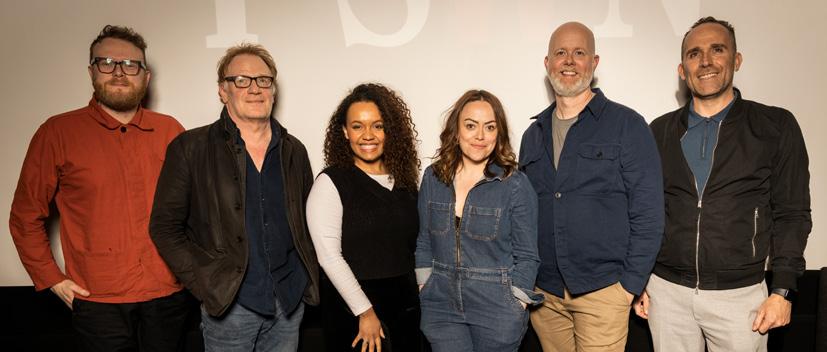
“The last couple of years have been great for us but we’re looking forward now to the next 40 years.”
Lewis Jones, who enjoys a prolific TV career, in and outside Wales, is optimistic that the Welsh renaissance can continue: “I was watching the Irish film The Banshees of Inisherin the other day and we have so many stories like that to tell, and we have the landscape, the actors and the whole technical side.
“What’s happening in Cardiff now, with all the studios opening and the [new] small independents – it’s just a great time for Wales in TV and film. I can’t see a ceiling.” ■
17 Television www.rts.org.uk May 2023
Y Sŵn was screened at the Soho Hotel, London on 25 April at an event organised by the RTS and is available on BBC iPlayer.
From left: Huw Stephens, Mark Lewis Jones, Lily Beau Conway, Sian Reese-Williams, Roger Williams and Lee Haven Jones
Paul Hampartsoumian
‘De-grimifying’ disability
Ido love a good podcast. Recently I – and many thousands of others –have been drawn to a new one called Movers and Shakers. The premise is simple; six people talk about their lived experience of Parkinson’s over a few drinks down the pub.
Add to that the fact that the six comprise the legend that is Jeremy Paxman, Vicar of Dibley co-writer Paul MayhewArcher, former BBC technology correspondent Rory Cellan-Jones, former Working Lunch presenter Gillian LaceySolymar, former BBC political expert Mark Mardell and High Court judge Sir Nicholas Mostyn and you have a winning formula.
There’s a magic to the counterpoint between Paxman’s trademark mardiness and Mayhew-Archer’s sunny optimism. Paxman sees the worst in everything, saying dryly in a “What have the Romans ever done for us?” moment: “Parkinson’s has given us fuck all.” Whereas Mayhew-Archer says Parkinson’s is one of the best things that has ever happened to him: it has helped him rediscover his love of performing (he has a one-man show – Incurable Optimist – devoted to his experience of Parkinson’s), it has connected him to people whom he would never otherwise have met, and he “wouldn’t have missed it for the world”.
The six contributors had been meeting up in a pub for two years before deciding to do the podcast. They found that talking about Parkinson’s and hearing from each other about their different experiences was helpful (well, most of them did). This led to the idea for the podcast; if talking and listening provided support for them, then it could also provide light and support more widely.
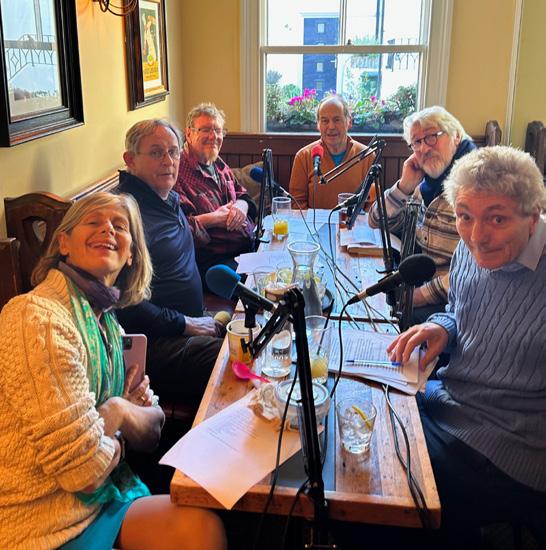
In the first podcast, released in March 2023, the six talk frankly about
the pain, the embarrassment, and the challenges of Parkinson’s. It becomes clear that, even among the six of them, there is a huge variety of symptoms. They highlight that the voices of people with the condition are not much heard, that others frequently speak on their behalf and that this is their chance to speak openly and honestly as people with Parkinson’s.
Lacey-Solymar sums it up when she says her aim is to “de-grimify” the condition.
And it works. Brilliantly! The podcasts (there are several in the series exploring subjects such as diagnosis, treatment, young-onset Parkinson’s)
18
Katy Boulton celebrates the Parkinson’s podcast Movers and Shakers as the kind of engaging content that helps us all to understand disability better Acast
Movers and Shakers in their pub studio
‘SO OFTEN, WE POLARISE THE TWO: EXPERTS ON THE ONE HAND AND LIVED EXPERIENCE ON THE OTHER’
are funny, personal, illuminating and informative.
At the heart of this success is lived experience. Until fairly recently, I had not much considered the importance of this. I suppose, like many others, I felt that expertise lay mostly with, well, experts. But for the past three years, I have been working with the Bafta award-winning disabled-led company TripleC.
Headed by Coronation Street’s Cherylee Houston MBE, Melissa Johns (Grantchester) and screenwriter

doesn’t mean that, when we employ or work with disabled people, we should expect them to be the educators.
The introduction of initiatives such as the 5As – Anticipating, Asking, Assessing, Adjusting and Advocating – which is supported by all the major broadcasters, underlines the fact that we are all collectively responsible for making sure relevant access is put in place so that deaf, disabled and/or neurodivergent people can do their best work. But in doing this, we all need to remember that every individual’s
successful. Listeners who have Parkinson’s or are family members of those with the condition write in with their experiences, adding another layer of lived experience. But the appeal is much wider, with large numbers of “neutrals” also becoming devotees.
This is illustrative of a much bigger change that we are starting to see in the television industry in terms of the inclusion of deaf, disabled and neurodivergent people.
TripleC provides access consultancy to broadcasters and production companies. Over the past few years we have supported the likes of Sex Education, The Cleaner, The A Word and many more. We help to ensure that lived experience is embedded in storylines and casting and we support productions to employ deaf, disabled and neurodivergent people in front of and behind the camera.
In his 2021 MacTaggart lecture, screenwriter and producer Jack Thorne, who is one of TripleC’s biggest supporters, challenged the industry to do better. There is still much to do, but we have seen real momentum building over the two years since Thorne threw down the gauntlet.
The Movers and Shakers podcast is one among many examples of how putting lived experience front and centre can make for fabulous content. Elsewhere we have seen Ralph & Katie (ITV Studios for BBC), Perfect (UKTV), the new CBBC drama A Kind of Spark and Chris Packham’s Inside Our Autistic Minds (BBC) and more.
Laurence Clark (Perfect), TripleC’s mission is to drive up the role of deaf, disabled and/or neurodivergent people in television, film and the arts.
So often, we polarise the two: experts on the one hand and lived experience on the other.
What I’ve learned from working with this amazing company is that lived experience can be an expertise in itself.
Hearing the Movers and Shakers contributors share their very different experiences of Parkinson’s matched very closely my experience of working with TripleC. I’ve learned that everyone is an expert in their own access. That
expertise regarding access is the expert in their own access.
The Movers and Shakers podcast underlines that people with the same condition can have completely different symptoms and lived experience. This is true not just of Parkinson’s, but across disability more widely.
Our starting point, when asking people about their access requirements, should focus on an individual’s lived experience (and the expertise that comes with it), rather than a one-sizefits-all approach that assumes that everyone with a particular condition needs the same access implementation.
Movers and Shakers has been hugely
Content such as this can attract big audiences, which helps to increase knowledge about neurodivergence and disability more widely. In this way, the changes in attitude we see within our industry can start to have a positive impact elsewhere. At TripleC, we call this the “penny drop” moment.
Of course, if we think deaf, disabled and/or neurodivergent people can tell only deaf, disabled and/or neurodivergent stories, we are missing the point. Inclusion goes far beyond that.
Movers and Shakers is a brilliant example of how taking lived experience as the starting point makes for excellent content that disabled and non-disabled people alike love to consume. Here’s to many more “penny drop” moments. ■
19 Television www.rts.org.uk May 2023
BBC
Katy Boulton is the strategy and operations lead at TripleC (triplec.org.uk).
Chris Packham in Inside Our Autistic Minds
Death. Dancing. Denial. Depression. Dishes best served cold. Who doesn’t love a dark, twisty tale from the BBC Two television phenomenon that is Inside No 9?

Not many, judging by the capacity audience last month at the Vue Manchester’s Screen 18 (18 is twice nine, after all), there to see an exclusive preview of the series 8 finale, The Last Weekend
“It’s nerve-racking,” said Reece Shearsmith, co-creator, co-writer and actor, when asked by Joe McGrath of BBC Radio Manchester how he feels about the unveiling of new work. “You fear the reaction to it. The bar is high for us, with what we’ve done so far.”
And the exposure on such a huge screen? Ian Bevitt, director of The Last Weekend, was very happy: “Ian McKellen said that [good film acting] is all in the eyes. It’s definitely there in the eyes, especially at the end.”
The beginning, however – the inspiration for the episode – came not from the subject matter, but from the structure. “In several episodes of Inside No 9, we’ve parcelled out how you see the story into chapters,” explained Steve Pemberton, the other co-creator, co-writer and actor.
“We did it with The Understudy, about the theatre,” Pemberton continued, “so we were able to break down the Scottish play (Macbeth to the non-superstitious) into five acts. To Have and to Hold was the marriage vows. This one was [psychiatrist Elisabeth Kübler-Ross’s] stages of grief.”
Therein lies what Pemberton refers to as “the Big Trick, which makes you think you’re watching this moving, tender love story… and that was the train we wanted you to be on, until you rumble what he’s really been up to… and, hopefully, it hits you with a nice surprise at the end”.
Thrills, spills… and kills
The modus operandi of the piece was something Pemberton had in mind for a while. “I’d come across it when I was writing a couple of episodes of ITV’s Whitechapel,” he said. “They gave me a storyline to do with books made of human skin. I did a lot of research around torture… and decided I was going to save [the idea] as… a nice punchline for an episode of Inside No 9.”
For Bevitt, the scary part was getting the script. “I’ve read a lot of scripts in my time, but it was watertight, airtight. There’s not a loose line or even word in it. My biggest fear was, ‘What if it overruns? How am I going to trim anything?’ But… it fitted perfectly.”
Of course, the setting is a big element in the story. “It needed to be somewhere isolated,” said Pemberton.
20
RTS North West hears from the creators of BBC Two’s gloriously sinister comedy anthology Inside No 9, who explain why variety is key to its success
BBC
Reece Shearsmith (left) and Steve Pemberton
“We knew we were going to film series 8 in and around Manchester, so we knew we were likely to find a nice lakeside setting.”
Bevitt took up the story. “It was a tricky thing… because it was nearly an hour away from the studios, so we lost quite a bit of filming time every day. And it was perfect on screen. But what you don’t see is an industrial unit to one side and somebody’s house on the other, so it was all the ‘magic of television’ stuff to make it look right.”
In The Last Weekend, Shearsmith and Pemberton play a gay couple. “It’s fun to do,” Shearsmith said. “We’d done that before, in the first ever episode of Inside No 9, Sardines.” And since the pair have been working together for “more than 30 years”, the warm chemistry they automatically share comes across effortlessly.
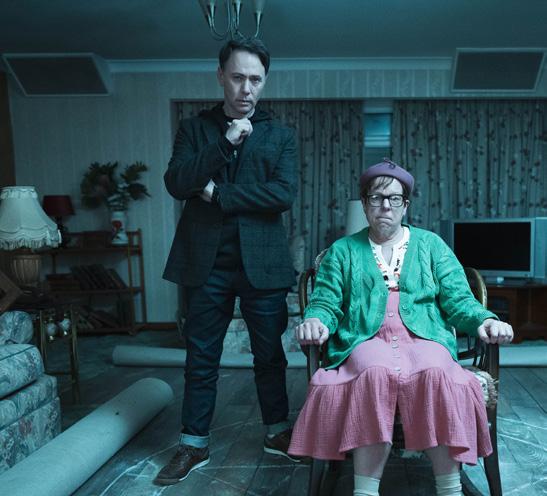
The other character in the episode, played by Sheila Reid (Benidorm, Call The Midwife), was inspired by the Scottish assistant of the promoter with whom Pemberton and Shearsmith worked years before at the Edinburgh Festival. “She just said to us one day, ‘I love cheese’, and we’ve been saying this to each other ever since for years, which is why [Glasgow-born Reid’s] character is Scottish.”
Pemberton knew that “Sheila was just perfect for the role.” This led to another element in the plot and another twist in the tale. “It all came together quite deliciously,” he said meaningfully.
Bevitt slotted smoothly into this tight-knit team. As a northern TV director he had worked previously with many of the crew, including producer Kim Crowther, editor Patrick Hall and director of photography Len Gowing.
Filming in Manchester was great, said Shearsmith. “If you’re at home, you have real life still going on… All we had to concentrate on [here] was just doing the best we could do.… Bringing the work up North, [we had] extra money… it has really helped the show.”
To Pemberton, originally from Blackburn in Lancashire, it was a “home from home”. “For this series and the one before we’ve been bringing in new directors, new directors of photography, new designers – and it refreshes the show.…
“We had an absolutely fantastic crew… and we’re hopefully going to come back and do more.”
Bevitt concurred: “At Yorkshire TV
and Granada, there’s always been a really strong hub of production, and it’s even bigger now: there are so many different programmes getting made.”
As for the music in this episode, McGrath described it as “a real earworm”. Pemberton told the audience: “We had written lyrics and sent them off to [composer] Christian Henson, who’s done all our music for Inside
Mother’s Ruin, “is a cross between necromancy and gangster film”, so already “there’s a great variety, which is what we love as writers and as actors”.
They have a list of “dream stars” they would love to work with in the next series. “We’ve had Sir Ian McKellen in our sights,” said Shearsmith, “but we haven’t had a part that has been right for him yet.”
No 9, and we asked, ‘Can you find a tune in this, 1990s boy-band style?’ He tweaked the lyrics and his assistant sang on it.”
For the dance moves, they got in a choreographer. “There are more lyrics, so we could flesh it out if there’s a demand,” joked Pemberton.
As with the song, Pemberton and Shearsmith write everything together. “We enjoy the process, coming up with new ideas and making each other laugh.… We do a lot of talking, then we write an episode and, as soon as that’s done, we try to write another. One that differs entirely from the one we’ve just written. And in that way we try to build up a series of episodes that have different flavours.”
In series 8, for example, there is “one which is very comic, and another which is more dark and thriller-y, and not as naturalistic as [The Last Weekend]”, Pemberton said. Yet another,
“We never write for particular actors,” added Pemberton. “We just write characters. And there’s such a wealth of acting talent, both comedic and dramatic, we’ve only just scratched the surface.”
Pushed on this, he admitted: “We’d have back someone we’ve used before: Julie Hesmondhalgh… and I’ve always wanted to work with Siobhan Finneran.”
The next series, fittingly series 9, will be the last. “We’re very pleased,” said Shearsmith, “with our lot from the BBC, where we’ve been allowed all these years… to explore all these different ways of telling a story.”
This included, added Pemberton, “filming a live special… An extraordinary achievement.” ■
Report by Carole Solazzo. The RTS North West Inside No 9 event was held on 19 April at the Vue cinema, Manchester Printworks, and produced by RTS North West in association with Plank PR.
21 Television www.rts.org.uk May 2023
BBC
Shearsmith and Pemberton in the Mother’s Ruin episode
Searching for the truth on political TV
Narinder Minhas
Ilike this book. No, wait – I really like this book! There you have it. The truth, the whole truth, and nothing but the truth. Or is it? How can we distinguish the truth from a bald-faced lie? Am I, the reviewer, telling fibs just as brazenly as a seasoned politician?
Joking aside, the truth is this: there is much to admire about Rob Burley’s new book, Why Is this Lying Bastard Lying to Me? Searching for the Truth on Political TV Part biography, part post-war history, and part love letter to the long-form political interview, it is jam-packed with anecdotes and wisdom from Burley’s 25 years as a top producer in political broadcasting. He also tackles perhaps the most elusive thing in his line of work: the truth.
The big problem is that lies are everywhere – on social media, in CVs, in boardrooms, on dating apps and, of course, in politics. There are many different ways to lie. Burley kicks off
Why Is this Lying Bastard Lying to Me? Searching for the Truth on Political TV by Rob Burley is published by Mudlark, priced £16.99. ISBN: 978-0008542481
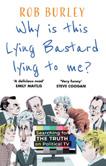
with a fascinating nugget: academics have identified 35 different ways in which politicians can avoid answering a question – from “acknowledging the question without answering it, questioning the question, attacking the question… making a political point instead of answering the question, repeating the answer to a previous question” to just blatantly ignoring the question.
In this last category, Boris Johnson was a prime culprit. He brazenly escaped into an industrial walk-in
fridge to avoid a Good Morning Britain interview. These are dark and cold times indeed.
So, what is the best route to the truth? Perhaps it really is the long-form political interview – and Burley provides an absorbing account of the titans of this skill, from Robin Day to Brian Walden, Jeremy Paxman to Emily Maitlis.
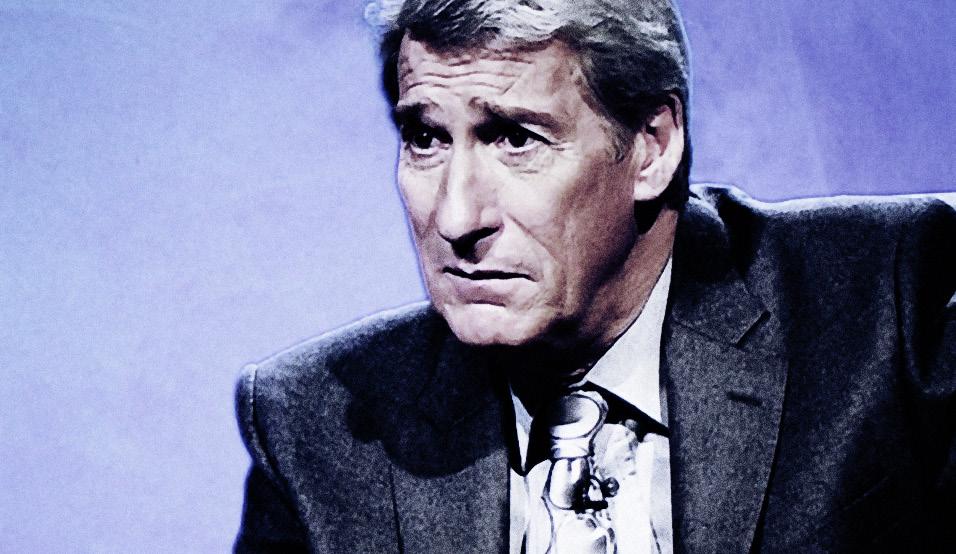
In one gripping section, Burley expertly narrates one of the most iconic interviews from the past 50 years: Walden vs Thatcher. The show: The Walden Interview, 1989. Unusually, Thatcher’s guard is down. Walden is an admirer of hers, almost a friend, almost a confidante. She expects things to go her way.
But the interview plays out like a political psychodrama. Trust is betrayed. Expectations are shattered as Walden turns rottweiler. Burley’s retelling feels like a movie script, capturing their interaction brilliantly, with all its nuances. I’m not saying it
22
BBC
savours a new book that is a love letter to the longform interrogation of politicians by broadcasters
The grand inquisitor: Jeremy Paxman
is Frost/Nixon, but it would make a fantastic film, perhaps with Michael Sheen playing Walden.
These kinds of interviews are no mean feat. They are an artform in themselves, involving enormous levels of preparation. I should know; I was a researcher on Walden’s other great show, Weekend World. The document we had to prepare for each interview was exhaustive and exhausting.
Not only did it need to include the key questions, but also every likely response to them. The whole thing would have “the underlying shape of a family tree” – if the minister says no, go to question seven. If the minister says yes, go to question 10, and so forth. Things can go sideways quickly in these interviews, and it is essential to be well-prepared.
Burley knows this all too well – especially when the interviewee is prepared to use a particularly sneaky tool: lying. In one compelling anecdote, Burley recalls an interview in 1997, in which Jonathan Dimbleby accuses Lib Dem leader Paddy Ashdown of making promises he can’t keep. Ashdown wants to increase spending on education by raising income tax.
Dimbleby argues that this money can’t possibly be ringfenced for schools. After all, Ashdown can’t control where local government spends its money. Ashdown pushes back: “Wrong, wrong, wrong.” He says Dimbleby has been “badly advised” by his researcher, and it’s all “in the detail of the manifesto”. Burley, the shamed researcher, scrambles to prove Ashdown is incorrect, flicking through the manifesto in a panic. But it’s too late. The interview has moved on. Later, at the postshow drinks, with a laugh, Ashdown brazenly admits to lying.
It is these moments – often funny, sometimes disturbing and, occasionally, very moving – that give this book its delicious insider feel. It brims with wonderful testimony, founded on great access.
The insights from Paxman are particularly entertaining, and Burley has high praise for him. Paxman is “allergic to being boring”, and his “apparent contempt” for his interviewees is addictive to watch.
Paxman was determined to get to the root of an issue. This is typified by his famous Newsnight interview in 1997 with Tory politician Michael Howard. The subject matter wasn’t anything special.
But, confronted with Howard’s stubborn elusiveness, an exasperated Paxman asked him a single question 12 times. A bold tactic and a far cry from where we are today, with Liz Truss getting away without doing a single set-piece interview yet still being elected Prime Minister by her party. What kind of precedent does that set? While Burley’s takes on these big moments in political interviewing form a hugely enjoyable chunk of the book, he also treats us to many left-field insights gleaned from working behind the scenes on some of the biggest political shows. Burley says that being the editor of BBC One’s The Andrew
funny and much-needed interrogation of what political TV looks like in the world of post-truth politics – and how on earth we got here.
Burley seems nostalgic for the golden age of political interviewing. Gone are the days when politicians felt a duty to show up, undergo a grilling, and endure the brutal media takedown in the papers the following day. Nowadays, politicians seem to grant the interviews where they will get the easiest ride. Burley is tentatively optimistic about Rishi Sunak and Keir Starmer, but it’s clear that the longform political interview is an endangered species.
Marr Show was the best job of his life.
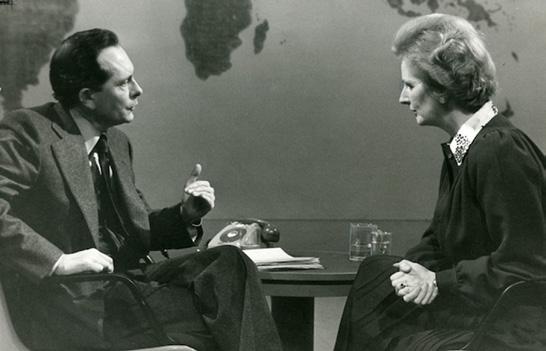
During the awkward meet and greets before interviews, which he hated, Burley was exposed to the varying ways in which politicians deal with small talk. I find it amusing how perfectly he has encapsulated the different characters. David Cameron: “aloof” and self-important (sure, he was PM, but “there was no need to be a dick about it”). Jeremy Corbyn: less interested in Burley, and more so in the excitable junior staff members. Theresa May: completely and utterly devoid of small talk.
I would have welcomed a few more facts or figures along the way, such as who is the least honest prime minister in history? What is the average number of lies in an election campaign? Or some more research from the social scientists. But, then again, practising what he preaches, Burley is clear from the outset: “This is not a textbook.” It is, however, an incisive, unflinching,
Why this sea change? Obviously, there is so much more choice than the three or four channels available in Day’s time. The Sunday morning TV political slot has sadly lost its resonance, diluted across today’s myriad platforms. And, of course, social media has completely changed the game. Why would a politician risk their credibility in a fierce interview, when they can control their message on Twitter?
Burley’s book strikes a perfect balance between accessibility and serious analysis, and carries an important message.
What he has laid out here truly matters, and we need to continue to demand the truth. As Burley says, we deserve it. For any politicians reading, there is a way to decline an interview with dignity. But just a clue – it doesn’t involve climbing into fridges. ■
23 Television www.rts.org.uk May 2023
ITV/LWT
Narinder Minhas is founder and CEO of Cardiff Productions.
The Walden Interview, 1989
Legacy of the black square
of external consultancies at the Lenny Henry Centre for Media Diversity, and Lucy Pilkington, Managing Director of Milk and Honey Productions.
“The reason this whole process started was because a black man lost his life in really tragic circumstances,” said Pilkington. “I think we sometimes forget that this was a response to ‘How can this happen in America now, in this day and age?”
After Floyd’s murder, she said: “My phone was ringing obscenely quickly.... In the short term, lots of black producers were working who weren’t working a few years ago.” But, she cautioned, this needs to be viewed in the context of a long drift away from caring about minorities and black people that commissioners and producers are trying to redress. “We are tasked with a job to tell the stories of people who can’t tell their own,” she said.
Some of the new demand came from Channel 4’s Black to Front initiative, a complete takeover of its scheduled programming for 24 hours by black broadcasting talent. The project, which took place in September 2021, was led by the channel’s head of specialist factual, Shaminder Nahal, and fellow commissioning editor, factual entertainment, Vivienne Molokwu.
“We were trying to think about something of scale that had legacy, to force people to think about what was happening and to reimagine our channel output,” said Nahal. “It allowed us to shift the dial a little bit.”
The Black to Front project took 16 months to come to the screen. More immediate was Channel 4’s commitment to be an antiracist organisation. Floyd died on 25 May 2020; Channel 4’s sixpoint pledge was delivered two weeks later.
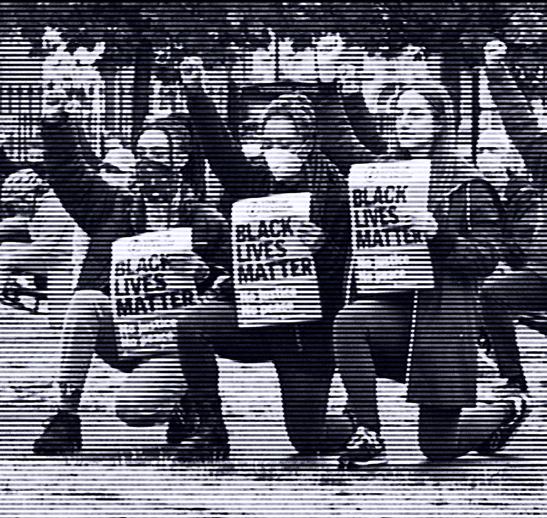
After the murder of George Floyd in 2020, many companies worldwide issued statements of solidarity and support, and posted black squares on their websites and social media feeds. In the UK, the movement galvanised the TV industry. Broadcasters took stock of the sometimes paltry proportion of their output they were commissioning from black people. ITV announced a Diversity Acceleration Plan while Sky pledged £30m to support antiracism and improve diversity and inclusion. As a result, there was an uplift in demand
for diverse talent, onscreen and behind the camera.
Weeks after the killing, Channel 4 made a new, sixpoint commitment to an antiracist agenda, while the BBC announced a threeyear, £112m fund for diverse and inclusive content.
But in the three years since Floyd’s death and these promises, what has been delivered and what may be to come? This question was at the heart of the RTS discussion “Legacy of the black square”, chaired by K Biswas, editor of Representology: The Journal of Media and Diversity. The panel featured speakers from the BBC, Channel 4 and Amazon, alongside Marcus Ryder, head
Ryder reminded the audience that, although Channel 4’s licence requirements were relaxed in 2003, in 2020 the broadcaster found itself under threat of privatisation. “In many ways, it found its boldness again,” he suggested.
However, he then took the channel to task on its delivery of various elements of that sixpoint commitment.
As an antiracist organisation, Ryder suggested it should support the independent racism monitoring proposals put forward by the media union Bectu.
He also suggested that its commitment to increase the commissioning of “relevant and authentic content” lacked key performance indicators and might benefit from an industry test,
24
Three years after the murder of George Floyd, an RTS National Event examines the impact on programming and commissioning
Brixtonbuzz.com
Demonstration in London, September 2020
along the lines of the Bechdel Test for representation of women in fiction.
Answering these points, Nahal pointed to the broadcaster’s work to ensure diversity, including consultation with the Lenny Henry Centre to reassess the channel’s position a year on from Black to Front. “We appreciate the challenge and scrutiny, it’s important to keep analysing,” said Nahal. “The only way we are going to make a difference is by never becoming complacent.”
The BBC’s head of creative diversity, Joanna Abeyie, defended the scope of the corporation’s £100m commissioning fund, which she described as “a floor of investment, not a ceiling.”
a commitment to fund national production in Scotland, with the definition of Scottish production being relatively straightforward. “One of the problems of the legacy of the black square is it was meant to be a response to antiblack racism and quickly morphed into addressing prejudice and bigotry in general,” he said. “If there should be a legacy, it should be that black lives matter.”
At Channel 4, executives no longer refer to BAME (black, Asian and minority ethnic people) and talk less about diversity in general, said Nahal. “One of the legacies is that we have to talk about what we mean more clearly.”
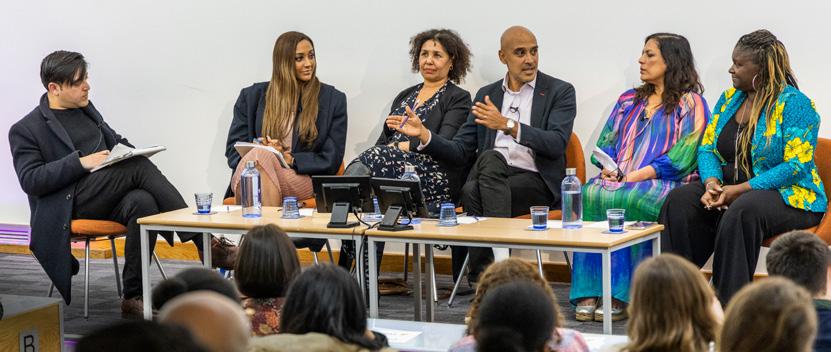
themselves accountable.” In many places they woke up to a wealth of talent and an audience that, historically, had not been considered.
Amazon has also been addressing commercial opportunities as it expands in the African market, with Prime Video now having dedicated country teams for Nigeria and South Africa, as well as several partnerships with African TV and film organisations. After Floyd’s death, it doubled down on US content, with shows such as One Night in Miami and Harlem. “Our customers hadn’t seen black stories in that way,” said Wayland.
“We’re talking about racial equity and understanding the financial
In response to concerns from panellists that the fund was too widely defined and lacked precise measurement and accountability, Abeyie said that an audit system had been in place since its inception, allowing for a rolling evaluation.
There are three core criteria: diverse stories and portrayal on screen; diverse production leadership; and diverse company leadership. “We realise there is space for improvement,” said Abeyie. “But it has shown us how we are spending and told us what our portrayal is looking like, as well as production talent.”
The BBC’s wider threeyear Diversity and Inclusion Plan was published in February 2021 and is being revisited for 2024 and beyond, with input from external organisations, including the Lenny Henry Centre. It will be “full of measurements”, promised Abeyie.
Ryder drew comparison between a commitment to fund diverse and inclusive commissioning and
The channel now ensures that every genre has a blackowned and an Asianowned production company on its slate.
In 2021, the organisation committed to tripling its spend with ethnically diverseled indies by the end of 2023.
After Black to Front, Channel 4 rewrote its commissioning guidelines to include the need for a senior figure in a production company to be from a diverse background. “We now have to have that conversation with the production company,” said Nahal.
Miranda Wayland, now head of international diversity, equity, inclusion and accessibility, content and strategy for Prime and Amazon Studios, took the discussion back to 2020, when she was at the BBC. “The entire industry in the UK and internationally started to deep dive into its portfolios,” she remembered.
“[Companies] found that the content spoke to stereotypes and tropes no longer acceptable and tried to make
rhythm that sits behind that, from development to green light, having intentional, authentic conversations,” she said. “In production and creative environments, we want to create psychologically safe spaces so that black talent can do their best work.”
For Pilkington, as an independent producer, the need to understand the specific opportunity, to make plans and build a production business with returnable shows requires a changing of the guard. “You need black executives making decisions about not only what black people are going to watch, but white people as well,” she said. “Of course, audiences will come to black stories and black heroes, but you’ve got to get behind it.… We need to have more confidence in black stories.” ■
Report by Pippa Considine. ‘Legacy of the black square’ was an RTS National Event held at the Cavendish Conference Centre in central London on 26 April. The producer was Angela Ferreira.
25 Television www.rts.org.uk May 2023
Paul Hampartsoumian
From left: K Biswas, Joanna Abeyie, Lucy Pilkington, Marcus Ryder, Shaminder Nahal and Miranda Wayland
Game on!
If there was doubt before, there is none now: The Last of Us and The Super Mario Bros Movie have proved that games can transfer successfully to TV and film.
Audiences and box office have been astonishing: HBO’s post-apocalyptic series The Last of Us pulled in 30 million viewers per episode, while Super Mario – despite a critical lashing – is closing in on $1bn in ticket sales.

And there are many more muchloved games to be adapted from an industry that is mammoth and growing. Worldwide – depending on which source you take – gaming is worth about $300bn a year, with more than 3 billion players.
The Last of Us video game, co-created by Neil Druckmann and Naughty Dog in 2013, has become a critically lauded TV series since its release earlier this year. Chris Salvaterra, senior vice-president for original drama at HBO, told an RTS panel that The Last of Us was “a collaboration of the highest order”, bringing together Druckmann and Craig Mazin, the creator of acclaimed HBO/Sky series Chernobyl
Speaking from Los Angeles, he revealed that Mazin “came in as a fan of the game, and I think that sparked… respect and collaboration between the two of them. Neil, to his great credit… understood that there were certain things that needed to be changed about the game to adapt it [into a] television series. So, really, it was this incredible mutual collaboration.”
Salvaterra is not a gamer, which he reckoned was an advantage: “I wasn’t burdened with the history of adaptations gone wrong – I just wanted us to make a great television series that stood on its own.
“But I also knew that if we [showed] fidelity to the source material… the
gaming audience would come, and my hope was that people like myself, who wanted to watch great television, would also come.”
But Salvaterra warned: “Every situation is different and I think we have to be careful not to foist a formula on to all [adaptations].
“As Craig Mazin has said often… we cheated. We found a game that is revered for its storytelling, and so that applied beautifully to the scripted format.”
What has held back the successful transfer of games to TV? The fantasy author and entrepreneur Sir Ian Livingstone, who has been involved in the gaming industry for almost five decades, suggested it is “the lack of understanding of gaming intellectual property [IP] and games themselves”.
He believed that “respect and authenticity” were key. “With The Last of Us, it certainly is a tipping point in how collaboration… respect for the IP and understanding of the gamer… and the story have meant an absolutely wonderful production, which has reaped its rewards.
26
HBO
Hit TV series The Last of Us is based on a video game. The RTS hears how respect and authenticity are key to a winning adaptation
HBO’s The Last of Us
“In film and TV, it’s the director who controls the action; in a video game, it’s the player who controls the action. So, they have a certain expectation of how a drama or dialogue should go. That’s historically never been understood by film- and TV-makers; hence, the awful reviews on Rotten Tomatoes of all the video games that have been adapted for TV and, primarily, film.”
Jon Wardle, director of the National Film and Television School, which offers a master’s degree in games design and development, said TV producers and film studios had tried to “go it alone without involving the original creators”, which had been a mistake. “When you come together and pool your collective strengths, you do better.”
Technological advances are helping to bring gaming and TV closer together. “The technology that’s being developed for the creation of video games is now very sophisticated,” said Jonny Slow, CEO of Pixomondo, a visual effects and virtual production studio recently bought by Sony Pictures Entertainment. “There are techniques from the video game production industry that have wide application in TV and film.”
Nevertheless, many gamers are quite happy to stay where they are. “Games students tell us they don’t want to work on film and TV,” said Wardle. “They’ve got all the skills… they can drive a game engine, and they’re like, ‘Why do I want to go and power a virtual production wall on a filmset when I can make my own original game IP.’”
Bronagh Monahan, co-founder of talent agency and production company MonRae, discussed some of the “digitalfirst talent” she represents, who tend to use YouTube and Twitch as their platforms of choice.
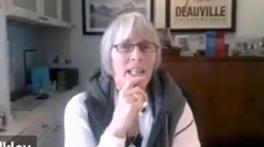
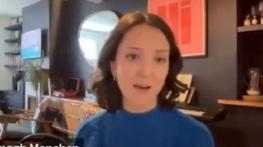
Tom Simons, better known as TommyInnit, produces Minecraft video game-related videos and live streams, and has more than 50 million subscribers across his channels. “He had the most-watched Minecraft stream – 697,000 people, all watching at the same time,” said Monahan.
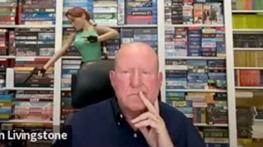
You would imagine that TV might want to borrow some of these viewers, but Monahan said its attitude was often unhelpful. “There’s been that lack of respect… TV producers coming on to calls and maybe being a bit snobby or… patronising about who these talents are,” she said. “I set up MonRae to say this is a legitimate part of the entertainment industry.
“These talents are often really young and come into a lot of money. They become very wealthy at a very young age and they need to be protected.
“They have ideas, they create stories. There is IP in what they’re doing on YouTube.”
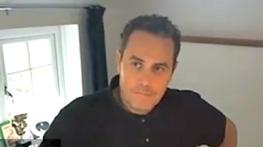
appreciate that film and television aren’t necessarily the Holy Grail [but] just… an aspect of the entertainment business.”
What video game franchise would the panel like to adapt for TV or film?
“If you’re looking at numbers you’d have to look at something like Grand Theft Auto,” reckoned Sir Ian Livingstone. “Grand Theft Auto V, released in 2013, generated $1 billion in three days of sales. That’s the largest entertainment franchise in any medium. I’m kind of surprised that a film hasn’t yet come out.
“Also, you have to talk about Minecraft – that would make an incredible movie…. But there are so many amazing IPs in the games world… there’s a rich [seam] there waiting for someone
Salvaterra accepted the accusation of snobbery towards gaming: “On behalf of the film and television industry, I apologise. I think, frankly, the entertainment industrial complex is shifting and I think that’s great, and I think we ignore that at our own peril.”
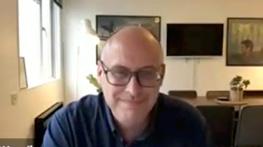
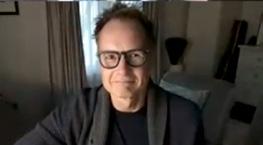
He added: “We [should] be open to other opportunities and talent, and
who’s exhausted the mines of comics and traditional IP.”
In fact, Minecraft fans will have to wait only a couple of years. Shortly before the RTS event, Warner Bros announced that beefcake actor Jason Momoa would star in a film adaptation of the video game, helmed by Jared Hess, director of Napoleon Dynamiter. The film’s box office success is almost certainly nailed. ■
Report by Matthew Bell. ‘Game on! The new world of opportunity in franchises across video games and TV’ was an RTS National Event, held on 24 April. It was chaired by journalist Kate Bulkley and produced by Ashling O’Connor and Daniel Korn.
27 Television www.rts.org.uk May 2023
‘WE HAVE TO BE CAREFUL NOT TO FOIST A FORMULA ON TO ALL [ADAPTATIONS]’
RTS
‘I’M KIND OF SURPRISED THAT A “GRAND THEFT AUTO” FILM HASN’T YET COME OUT’
Jonny Slow
Chris Salvaterra
Sir Ian Livingstone
Kate Bulkley
Jon Wardle
Bronagh Monahan
RTS NATIONAL EVENTS

Panellists
Meet the team behind the greatest show on earth
Monday 5 June 6:30pm for 7:00pm start
Venue: Cavendish Conference Centre, London W1G 9DT
Booking: rts.org.uk Tickets £15 or free if an RTS member
In conversation with Zai Bennett
Managing Director of Content, Sky UK and Ireland
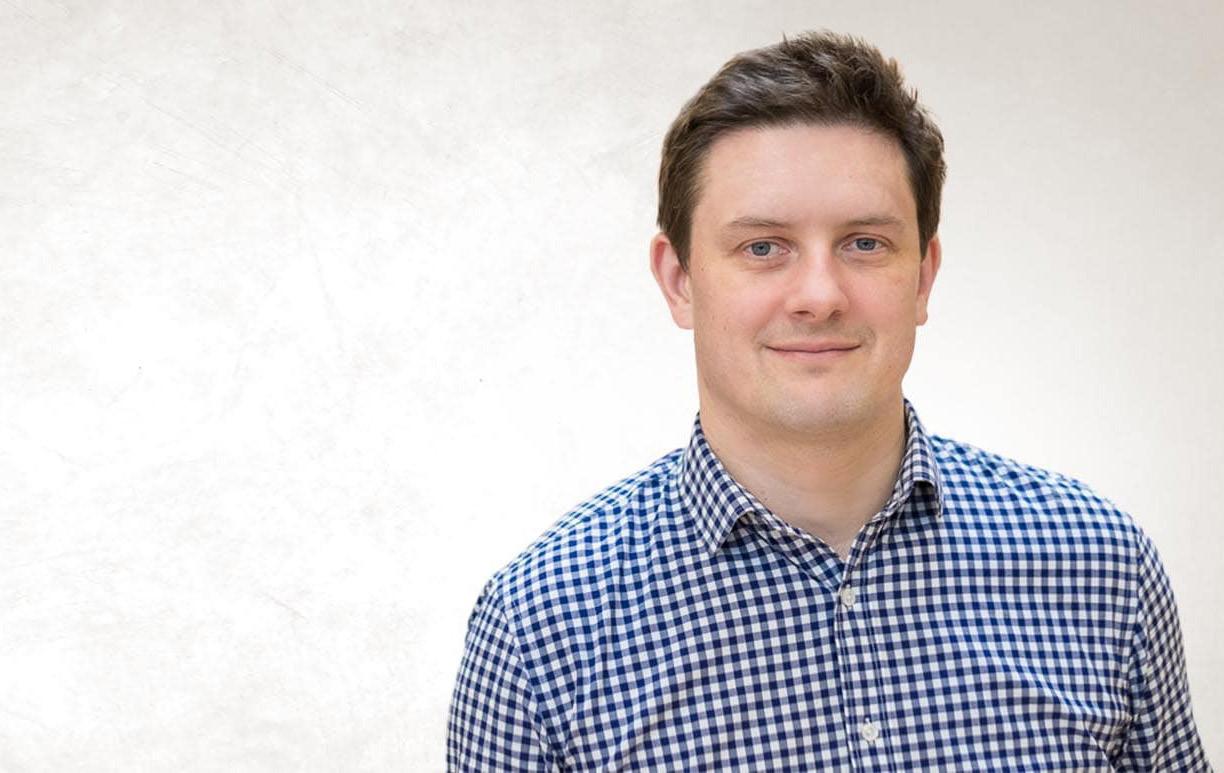
Hosted by TV and radio broadcaster Nikki Bedi
Tuesday 16 May 6:30pm for 7:00pm start
Venue: Cavendish Conference Centre, London W1G 9DT
Booking: rts.org.uk Tickets £15 or free if an RTS member
Kate Phillips, Director of Unscripted, BBC
Lee Smithurst, Head of Show, BBC Studios
James O’Brien, Executive in Charge of Production, BBC Studios
Nikki Parsons, Lead Director, BBC Studios
Sam Quek, Chair; Morning Live; presenter of the Eurovision Turquoise Carpet Opening Ceremony

28
RTS NEWS
Theo Johnson has already achieved an impressive amount – not least making a film for £200 that has been seen by 1 million people –and he is only just beginning.
The amiable 29-year-old was a hugely inspiring figure for the young audience at the RTS Midlands Student Awards (see page 35) last month. As well as hosting the ceremony, he was part of the BBC Academy masterclasses before the event.
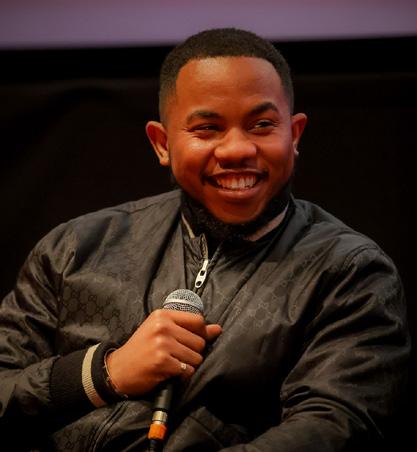
He is a multi-hyphenate, having worked as a model, music artist and BBC 1Xtra presenter, as well as writing, acting, directing and producing his own films and comedy sketches. He has acted in the Channel 4 sitcom Raised by Wolves and the BBC soap Doctors. His first short film, Friend Zone, was made with £200 and received 500,000 views in one day on YouTube.
Johnson grew up in Handsworth in inner-city Birmingham, where he witnessed his first drive-by shooting at age 12 and saw two people fatally stabbed. Telling his story at an event one day, he reduced one audience member to tears. She promised to help him and, through her connections, his film Just One Drop was picked up by Amazon Prime. It was made with £25,000 to raise awareness of the horror of acid attacks.
The follow-up, Just Two Drops, set in a prison, is to be released shortly, with a budget of £70,000 and featuring rapper C Montana, celebrities from Love Island and Peter Andre’s son Junior.
Johnson told the RTS: “I have so many labels and job titles because of all the doors closed in my face.
After I acted on Channel 4, I went back to my hood and thought everything was going to be great. But I
do it just because it’s
Roz Laws listens in to some inspiring local talent in Birmingham
was broke and looking for another job. Instead of waiting for the phone to ring, I had to create opportunities for myself. I taught myself to write, direct and edit. I say: ‘Don’t find the problem, find the solution. And don’t procrastinate, just do it.’
“I’m constantly knocking on doors, but I never like to go to the table with my hand out, I like to bring something.
“I was scared to put my films out so I started doing comedy sketches online. I built myself a brand and an audience with 100,000 followers on Instagram. The secret of making online content go
viral? Try to be different, and don’t do something just because you think it’s cool. My family love game nights so I’ve made a comedy sketch about playing Monopoly featuring rappers Jaykae and Ambush.
“I am nowhere near where I want to be, but I know I’m going to get there. I want to be the UK Adam Sandler – he makes all his own films and puts his friends in them.”
The masterclasses also featured Amber Sandhu, a presenter on BBC Midlands Today, who has just landed her own show on the BBC Asian Network, and Summaya Mughal, a BBC Radio Leicester presenter and the creator of the award-winning podcast Brown Gal Can’t Swim

Sandhu had two important pieces of advice: “Say yes to everything – you don’t know where it might lead. And you have to have a presence on social media. Posting your own content can be exhausting but you have to do it, without bragging or showing off, so people know what you’re doing – it’s our CV. You don’t need snazzy equipment; you can film it all on your phone.”
Mughal was embarrassed that she couldn’t swim, so she started having lessons and recording her thoughts before she was commissioned by BBC Sounds.
She said: “It was a story I believed was important to tell [for] other people. If you’re passionate about something but you’re struggling to get people to believe in your idea, go ahead and do it anyway. Then you’ll have something tangible to show them”. ■
The BBC Academy masterclasses were held at the MAC in Birmingham on 21 April and supported by Create Central.
29 Television www.rts.org.uk May 2023
Vivienne Bailey
Theo Johnson
‘Don’t
cool’
RTS Midlands
Vivienne Bailey
Summaya Mughal
AView from the Terrace began life as a podcast but is now a hit weekly BBC Scotland football show, mixing chat and comedy – and all from the perspective of the fans.

At an RTS Scotland event late last month, the programme’s producers at Studio Something discussed how they successfuly transferred the podcast to TV.
Jordan Laird, co-founder of Studio Something and director of A View from the Terrace, spoke about how the company and his career began: “We really wanted to make films, but no one would pay for us [to do it] obviously, so we started making music videos in our spare time.
“While we were doing that, we realised we were scripting, directing, producing – the whole shebang.” They began to wonder whether they could start a company just doing this. “We are massive football fans and… it all just came together.”
Andy Maas, now head of production at Studio Something and producer of the series, said: “I loved what they were doing at Studio Something, but I definitely knew they needed a producer. We shared the same values, and we had the same tone and sense of humour.”
BBC Scotland had a gap in the schedules and was willing to pay for a pilot. Maas said: “Pilots are quite rare now and they were looking for an entertainment sports show to fill the 10:30pm slot. So, we thought [about our] football podcast, The Terrace, and how to we could make that into a TV show.”
Laird added: “It’s superinformed fans who love Scottish football. If we took that to TV, that’s the hook – the fans’ angle hadn’t been represented on television in Scotland before.
“We’ve always tried to look
From podcast to TV
RTS Scotland
Beth Watt discovers how Studio Something turned its podcast into A View from the Terrace for BBC Scotland
at [football] from a journalistic angle – it’s the interesting questions around Scottish football that we love to answer. What is it like to watch football if you are visually impaired, for instance?”
The Terrace was the first podcast in the UK to be turned into a BBC show. It was initially commissioned for 10 episodes by the new BBC Scotland channel, and has now run for five series.
The quick turnaround required for each episode demands a fast-paced production process. “We don’t want to do the same [thing] every week,” Laird explained. “It will get stale and it doesn’t keep [the show] fresh. We’ll design the editorial and then we put in a script… then we send it out to whoever is coming on the show next week.”
Responding to a question about breaking into the industry, Laird said: “I remember where I was at – you think it’s never going to happen [but] you work hard and just keep an eye on those opportunities and be patient.
do anything of note until I was in my late twenties. It’s having the ability to back yourself – and I guarantee you’ll get that opportunity.”
A fan of the show, Aidan Lynn, told Television why he attended the RTS Scotland event: “You’ve got the guys here who explain not only what they do, but how they do it – it’s a great opportunity.”
He added: “I think that, a lot of the time, [football] fans don’t feel as though they have a voice; I think it should be the number one priority. At the end of the day, without the fans you wouldn’t have a club.” ■
“Also, I feel no one is special. We are all about not pulling the ladder up after ourselves, we help anybody and reach out to people.”
Maas added: “I didn’t
The RTS Scotland event ‘A View from the Terrace: Turning around topical TV’ was held at Edinburgh Napier University on 27 April. It was hosted by Amy Irons.
30 RTS NEWS
BBC Scotland
Craig Telfer, host of A View from the Terrace
‘WE ARE ALL ABOUT NOT PULLING THE LADDER UP BEHIND US’
Following the huge success of Rise of the Warrior Apes, the Oscarwinning director James Reed returned to Uganda’s Ngogo Forest for another look at some of our closest living relatives, chimpanzees. Chimp Empire, which follows two rival troops of chimps, was previewed at a sold-out joint RTS West of England/ Wildscreen Network screening at the Watershed in Bristol, ahead of its release on Netflix last month.
The team spent 18 months filming a four-part series that required extensive research. “We spent months analysing every detail about every chimp known to the scientists,” explained Reed, “so we had these huge backstories from every individual chimp.”
They worked very closely with the Ngogo Chimpanzee Project, with Reed praising the scientists who “were involved on every level…. Every time we had a storyline that we were shaping out, we shared it with [Professor John Mitani].”
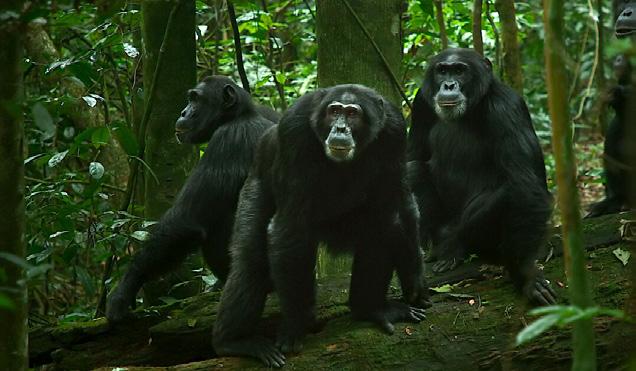
The production took a different approach from most natural history shows, by not being prescriptive about looking for specific behaviours. “We were
Inclusion can fill new studio jobs
The RTS Technology Centre held an event with Buckinghamshire New University last month, titled “You too can work in TV”, which looked at ways to make the TV and film industry more inclusive.
In South Bucks alone, more than 20,000 jobs will be created in the next two years by new studios.
Bristol champions chimps
focused purely on character from the beginning,” said Reed. “Our characters led us into really interesting behaviours. We… [got] some incredible things that, from a behavioural point of view, haven’t been seen before.”
Much of Chimp Empire is shot handheld, setting it apart from other shows in the genre. “It’s an incredibly beautiful and well-shot series,” said Reed, “but it incorporates styles that, on some… blue-chip natural
Bob Clarke: ‘Diversity?… inclusion is a better word’
history [shows], wouldn’t make the cut.
“I think that many of the events we needed to tell the story were only possible to capture handheld…. It gives it a different feel.”
In the edit, Reed and his team experimented without voiceover, before settling on a script. “The style of the script lends itself to storytelling,” said the series producer, Callum Webster. Reed said the Oscar-winning actor Mahershala Ali was “one of
The session explored the idea that the industry should not be “doing” diversity, but rather focusing on developing an inclusive environment in which all talent can flourish. Only by casting the net more widely to discover where this talent is will film and TV start to meet such ambitious employment targets.
The panel discussed the way people on all sides need to be innovative, both in the way that workers are recruited and how candidates can find out more about the roles in which they might flourish.
The panel, chaired by Martina Porter, MD of All Spring Media, reflected on
the first, if not the first person, we approached”.
Documentary storytelling lends itself to debate about the accuracy of the narrative. “It is an authentic story; it is how it happened,” Reed said, “but, obviously, we make a lot of creative choices about what goes in and what doesn’t, so we are adapting the reality to a degree in terms of where we place emphasis and the words that we choose.”
Seraphina Allard-Bridge
how developing an inclusive industry had suffered setbacks over past decades, not least because people had been afraid of doing or saying the wrong things.
Bob Clarke, CEO and founder of the Mama Youth Project, said everyone makes mistakes, but the answer is to learn from them and make the industry a better place.
“It’s a great place to work,” he said, “and I still get a buzz from it. Let’s ensure all of the next generation have the same opportunity.”
Highlights of the event will be released on the RTS YouTube channel on 17 May.
Tim Marshall
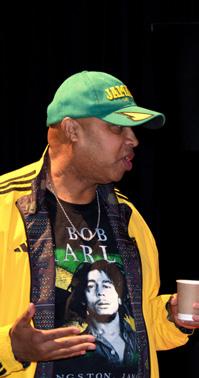
31 Television www.rts.org.uk May 2023
Chimp Empire
Netflix
RTS West of England
Stephen Stewart
Technology Centre
RTS CENTRE AWARDS
RTS Cymru Wales
Life and Death in the Warehouse won two big prizes at the RTS Cymru Awards: the BBC Three film secured the Drama award and its star, AimeeFfion Edwards, took home the Drama Performance prize.
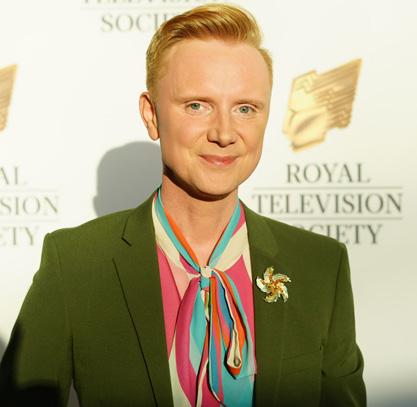
The single drama, written by Helen Black, was inspired by real stories of warehouse workers in Britain and the poor conditions they endure.
The Factual prize was awarded to ITV Cymru Wales documentary Miscarriage: The Hidden Loss, which was presented by ITV Wales at Six and Wales This Week host Andrea Byrne.
The new Sports Documentary prize went to Barn Media’s series for BBC One Wales, Together Stronger, the story of how the Wales football team was transformed from also-rans to tournament regulars.
New Location Manager and Production Manager awards were also introduced to throw the spotlight on vital roles that don’t always get the attention they deserve in the TV industry. Miglet Crichton took home the Location Manager award for her work on BBC One fantasy drama His Dark Materials,
Life and Death in the Warehouse starred Aimee-Ffion Edwards BBC
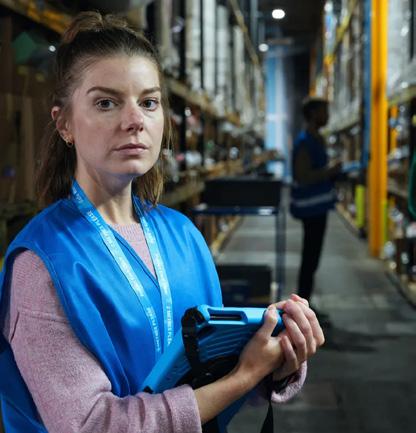
Powerful drama nabs two prizes
while James DeHaviland won the Production Manager – Drama prize for Disney+ series Willow, and Lowri Farr won the Production Manager
– Factual award for S4C reality show Prosiect Pum Mil RTS Cymru Wales’s third industry awards were hosted by TV presenter Owain Wyn
RTS Cymru/Wales Television Awards winners
Industry Categories
n Drama•Life and Death in the Warehouse•BBC Studios for BBC Three
n Comedy or Entertainment•Hywel Gwynfryn Yn 80•Slam Media for S4C
n Factual•Miscarriage: The Hidden Loss•ITV Cymru Wales
n News (Short)•The Afghan Children of the Urdd•ITN for Channel 5
n Sports Documentary• Together Stronger•Barn Media for BBC One Wales
n Children’s•Y Goleudy•Yeti Television for CBBC
n Digital Original• Solo and Unsupported•Cwmni Da
n Drama Performance•Aimee-Ffion Edwards, Life and Death in the Warehouse•BBC Studios for BBC Three
n Presenter Of The Year•Chris Roberts
n Rising Star•Luc Daley
n Multiskilled Journalism or Producer• Tom Brown
Evans. The ceremony at the Royal Welsh College of Music and Drama in Cardiff was sold out.
Rakie Ayola, who starred in BBC Wales drama The Pact, awarded the gongs to winning postgraduate students.
For the student awards, which are held in separate undergraduate and postgraduate categories, the wins were shared around the region’s colleges and universities.
“I feel we’re firmly established as an awarding body in Wales and, by combining student awards with industry ones, we are bringing the programme-makers of today face-to-face with the programme-makers of tomorrow,” said RTS Cymru Wales Chair Edward Russell.
At the ceremony, guests watched a special archive item that celebrated Welsh content across the globe. Russell said: “We took time to look back at output across the region from years gone by. Each of our three broadcasters is hitting a milestone in 2023: 100 years of the BBC in Wales; 65 years of independent television; and, of course, we are in the midst of S4C’s 40th birthday.”
Matthew Bell
n Location Manager•Miglet Crichton, His Dark Materials Bad Wolf for BBC One/HBO
n Production Manager: Drama• James DeHaviland, Willow• Lucasfilm for Disney+
n Production Manager: Factual• Lowri Farr, Prosiect Pum Mil Boom Cymru for S4C
Student Categories
n Undergraduate: Animation• Morlyn Sbwriel (Litter Lagoon)• University of South Wales
n Undergraduate: Drama•Benighted• University of South Wales
n Undergraduate: Factual•Hudson’s Story•Cardiff And Vale College
n Postgraduate; Environment and Sustainability•Saviours from Extinction Cardiff University
n Postgraduate Factual•Ride the Spine• Cardiff Metropolitan University
n Postgraduate Journalism• The Invisible People Cardiff University
n Craft Skills: Sound•Matchiko• Bangor University
32
Rahim Mastafa
Owain Wyn Evans hosted the awards ceremony
RTS West of England
The BBC Natural History Unit’s The Green Planet was the big winner at the RTS West of England Awards. The fourpart BBC One series took home four prizes: Natural History, Cinematography, Editing and Sound.

Narrated by Sir David Attenborough, The Green Planet explores the fascinating and often bizarre world of plants. It was hailed by the judges as “ground-breaking, innovative and brilliant – an important story about our world in these times of great change”.
Two programmes notched awards two years’ running. The second series of Stephen Merchant’s BBC One comedy thriller The Outlaws won in the Scripted category, repeating its triumph last year.
The judges commended the “sharp writing, fantastic performances and the seamless switch from comedy to drama”. John Butler, who helmed The Outlaws, received the Director award.
Five Mile Films series for Channel 4 The Dog House, the dog dating show in which people and dogs are matched, won the Factual Entertainment category for the second year in a row.
Frank Films’s BBC One documentary Trawlermen: Hunting the Catch, which follows deep-sea fishermen
RTS West of England Television Awards winners
Scripted•The Outlaws•Big Talk Productions/Four Eyes Entertainment for BBC One
Natural History•The Green Planet•BBC Studios Natural History Unit, with The Open University, bilibili, ZDF German Television, France Télévisions and NHK for BBC One
Documentary•Drugsland: Going Country Marble Films for BBC Three
Factual•Trawlermen: Hunting the Catch Frank Films for BBC One
Factual Entertainment and Features• The Dog House Five Mile Films for Channel 4
On-screen Talent•Bertie Gregory, Epic Adventures with Bertie Gregory• Wildstar Films for Disney+
Flying Futures•Abdimalik Abdullahi, Drummer TV
‘Innovative and brilliant’
risking their lives to bring in the catch, nabbed two awards: Factual and Production Management – the latter for Megan Pinches.
Explorer and film-maker Bertie Gregory took home the On-screen Talent award for his work on Wildstar Films’s Disney+ series Epic
News or Current Affairs Story• Decoy, ITV News West Country•ITV
News or Current Affairs Journalist• Beth McLeod, We Are England•BBC Bristol for BBC One
Animation•Sesame Street: The Nutcracker Starring Elmo and Tango• Sesame Workshop and A Productions for HBO Max
Children’s•The Last Bus Wildseed Studios for Netflix
Short Film•After the After Party Calling the Shots
Director•John Butler, The Outlaws
Big Talk Productions/Four Eyes Entertainment for BBC One
Composer•Jim Cornick and Matt Loveridge, Rendezvous with the Future• BBC Science for Bilibili
Cinematography•Cinematography Team, The Green Planet•BBC Studios Natural History Unit, with The Open
Adventures with Bertie Gregory Drugsland: Going Country, made by Marble Films for BBC Three, triumphed in the Documentary category.
In the news categories, Beth McLeod was awarded the Journalist prize for We Are England, and the News Story prize went to Decoy,
University, bilibili, ZDF German Television, France Télévisions and NHK for BBC One Editing•Editing Team, The Green Planet BBC Studios Natural History Unit, with The Open University, bilibili, ZDF German Television, France Télévisions and NHK for BBC One
Grading•Simon Bland, Dynasties II•Films at 59 for BBC Studios Natural History Unit
Sound•Sound Team, The Green Planet BBC Studios Natural History Unit, with The Open University, bilibili, ZDF German Television, France Télévisions and NHK for BBC One
Production Management•Megan Pinches, Trawlermen: Hunting the Catch•Frank Films for BBC One VFX and Digital Creativity•Lindsay McFarlane, Elliot Newman, Fay Hancocks and Andrew R Jones, Prehistoric Planet BBC Studios Natural History Unit for Apple TV+
an ITV News West Country documentary about a 1970s covert operation to catch the Clifton Rapist.
Katherine Kelly and Joe Sims, both of whom star in new ITVX sitcom Ruby Speaking, hosted the RTS West of England Awards.
Guests included The Outlaws actors Gamba Cole, Jessica Gunning, Clare Perkins and Rhianne Barreto, ITVX’s McDonald & Dodds star Tala Gouveia, and actor and comedian Sally Phillips. The third series of The Outlaws is filming in Bristol.
RTS West of England Chair Lynn Barlow said the awards saw “an amazing range of winners across all genres, proving the West Country’s programme-makers are at the top of their game”.
The awards, in association with Evolutions Bristol, were held at Bristol Old Vic in April.
Matthew Bell
33 Television www.rts.org.uk May 2023
The Green Planet BBC
Lucy Edwards, a visually impaired journalist, took home the Documentary award from the RTS Southern Professional and Student Awards last month for How Does a Blind Girl Go on Safari?
Edwards came to the stage with her guide dog, Miss Molly, and producer Sam Supple to pick up the prize for The Travel Show programme on the BBC News Channel.
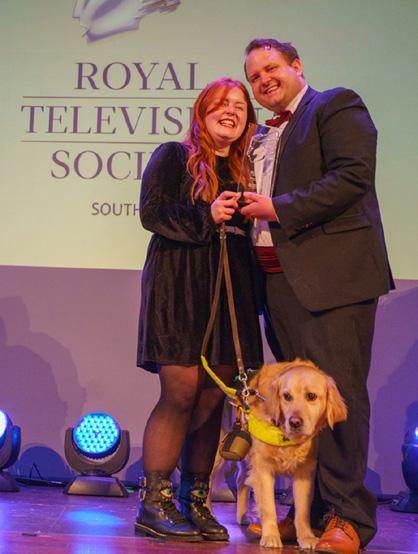
“This award is for every disabled journalist who wants to produce stories, not just on disability, but on very visual topics,” she said.
The award for Factual Series went to an intriguing programme about King Charles II, made by Phoenix Television for Sky History. In Royal Autopsy, Professor Alice Roberts investigates the cause of death of the monarch, using new historical research, forensic pathology and special effects.
ITV News Meridian won the Strand Within a News or Magazine Programme category for Elements, a series of short features about climate change, based on the four natural elements, earth, wind, fire and water.
In the other news categories, ITV notched up two more wins: ITV News Channel’s sports correspondent Keilan Webster was named Special Features Journalist, while ITV Meridian West picked up the
Travel show doc wins top prize
award for Regional News Programme.
For the second year running, BBC South East’s Colin Campbell took home the Regional TV Journalist award.
A one-off award for Royal Programming was made to
Channel TV for its moving and fascinating coverage in The Queen’s Funeral The awards ceremony returned to the Guildhall in Winchester after a two-year break during the Covid pandemic, when awards were
RTS Southern Television Awards winners
Industry Categories
n Documentary•How Does a Blind Girl Go on Safari?, The Travel Show BBC News Channel
n Factual•Royal Autopsy• Phoenix Television for Sky History
n Royal Programming•
The Queen’s Funeral•Channel TV
n Regional News Magazine Programme•ITV Meridian West
n Regional Television Journalist• Colin Campbell•BBC South East
n Special Features Journalist• Keilan Webster•ITV News Channel
held online. Sangeeta Bhabra from ITV Meridian and BBC South’s David Allard hosted the ceremony.
The student categories were dominated by Arts University Bournemouth, which won three of the four prizes on offer for Animation (Dadaland), Drama (The Cubicle) and Factual (P is for Paradise).

The latter was “exceptional”, said the judges, praising a film that explores the relationship between a daughter (the film-maker) and a father diagnosed with Parkinson’s disease.
The Entertainment and Comedy Drama award went to Portsmouth University for Death Comes Knocking, which the judges said had “laughout-loud moments, several plot twists and great use of music”.
RTS Southern Chair Stephanie Farmer said: “It was wonderful to get everyone back together in one space and to celebrate the talented folk who work and study in our region. Regional journalism is so important, and the quality seems to get higher and higher each year.
“That also goes for the indies and student talent that is produced across the South. The awards always affirm what we already know – there is a wealth of creativity and knowledge in the South that is rightly award-winning.”
Matthew Bell
n Strand within a News or Magazine Programme•Elements• ITV News Meridian
n Short Form•Pop Paper City• LoveLove Films for Channel 5
n Camera•Andy Robinson
BBC England
n Post-production•David Head
Student Categories
n Animation•Dadaland Arts University Bournemouth
n Drama•The Cubicle• Arts University Bournemouth
n Entertainment and Comedy Drama• Death Comes Knocking•Portsmouth University
n Factual•P is for Paradise• Arts University Bournemouth
34
Southern Centre
David Smith Arts University Bournemouth students
David Smith
Lucy Edwards, Sam Supple and Miss Molly
Torres takes Sir Lenny prize in Brum
Julia Irastorza Torres was named the overall winner at the RTS Midlands Student Television Awards at The MAC in Birmingham last month, when she lifted the prestigious Sir Lenny Henry Award.
The Nottingham Trent University student’s film, Orange Striped Socks, which also won in the Animation category, was chosen by the Dudley-born comic and actor, who praised its “extraordinary craftsmanship”, calling it “very moving and beautifully well done”.
The night’s other principal awards were shared around the region’s universities.
Staffordshire University student Anya Szelewska took home the Drama prize for
TheUPSIDE
TV’s crowning glory fills the airwaves
Queen Elizabeth II’s coronation in 1953 inaugurated the age of television in the UK. Thankfully, we no longer watch on nine-inch mono sets. Seventy years later, the medium’s power to capture the ritual pomp and occasional moments of intimacy of a coronation is greater than ever. UK viewers could choose between BBC One, Two and iPlayer, ITV and Sky News to watch the King’s coronation live.
The service to mark the
The Birds Nest. The Entertainment and Comedy Drama award went to Unscripted, which was made by Coventry University students Toby Stephenson, William Smith and James Wise.
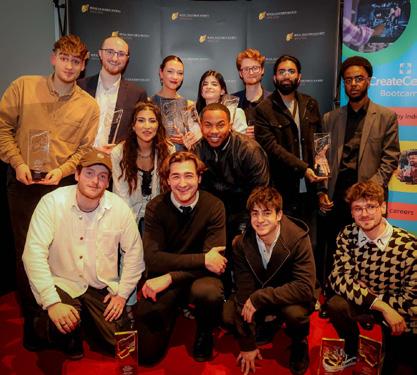
Aaron Badhan, Abdulrahman Jalfar, Dario Liguori and Mohammed Ahmed from Birmingham City University
new monarch’s accession had a multi-faith dimension and a more inclusive audience in the Abbey.
Likewise, there were more people of colour involved in the broadcasters’ coverage, including Charlene White, David Olusoga, the Rt Hon Patricia Scotland and Ashley John-Baptiste, Anita Rani and Nina Hossain presenting and providing commentary.
London calling to the media mavens
Staying with the coronation, the new RTS London Podcast sounds like an unmissable audio feast. Episode 1 discusses the royal event with ITN producer Tami Hoffman.
There is also an item on the Eurovision Song Contest, with Paddy O’Connell and BBC
triumphed in the Factual category with Gambling: A Gambler’s Gambit
In the craft categories, Coventry University’s David Bohus bagged two awards: the Camera prize for Birth of the Butterflies and the Editing gong for 97%
RTS Midlands Chair Kully Khaila said: “I lost count of
Eurovision reporter Daniel Rosney. Other contributors include Janine Gibson of the FT and ex-Feedback presenter Roger Bolton analysing the latest media stories. The hosts are broadcaster Andrew Eborn and journalist Nadine Dereza.
BBC watchers scan for hats in the ring
A new BBC Chair should be in place by summer, following the resignation of Richard Sharp. There is no shortage of potential candidates. BBC Board member and Deputy Chair Damon Buffini is thought to be in the running. But could the vacancy attract interest from Sharon White, whose tenure running Ofcom is highly relevant?
Another exceptional candidate is Peter Bazalgette. His
RTS Midlands Student Television Awards winners
Sir Lenny Henry Award and Animation•Orange Striped Socks• Julia Irastorza Torres, Nottingham Trent University
Drama•The Birds Nest Anya Szelewska, Staffordshire University
Entertainment and Comedy Drama• Unscripted Toby Stephenson, William Smith and James Wise, Coventry Uni.
Factual•Gambling: A Gambler’s Gambit•Aaron Badhan, Abdulrahman Jalfar, Dario Liguori and Mohammed Ahmed, Birmingham City University
Craft Skills: Camera•Birth of the Butterflies David Bohus, Coventry University
Craft Skills: Editing•97%• David Bohus, Coventry University
Craft Skills: Sound•Big Boys Don’t Cry• Oscar Bell, Darcey Wootton-Davis and Cameron Tura, Staffordshire University
Craft Skills: Writing•The Leak• Ed Griffin, Nottingham Trent University
how many times the guests who kindly agreed to give out awards were stunned by the incredible work they saw on screen. I echo their thoughts wholeheartedly: the level of entries this year was outstanding. The Midlands screen sector has a radiantly bright future.”
Matthew Bell
broadcasting experience and knowledge of the UK creative industries are second to none. David Dimbleby, a runner on previous occasions, has ruled himself out.
Blues Lights shine bright for Two Cities
One of the spring’s hottest shows is Blue Lights, BBC One’s Belfast cop drama, which has been renewed for a second series.
Blue Lights was made by Alex Graham and Michael Jackson’s company, Two Cities Television, only its second drama (the first was the brilliant Patrick Melrose). It was written by Declan Lawn and Adam Patterson, the pair who created the impressive The Salisbury Poisonings. How’s that for consistency? ■
35 Television www.rts.org.uk May 2023 RTS CENTRE AWARDS
RTS
Midlands
RTS Midlands Student Television Awards winners
Vivienne Bailey
RTS Principal Patrons
RTS International Patrons
RTS PATRONS
BBC Channel 4 ITV Sky
A+E Networks International
Apple TV+
Kinetic Content
Liberty Global
NBCUniversal International
Netflix
RTS Major Patrons
Accenture
All3Media
Audio Network
Banijay UK
Boston Consulting Group
Channel 5
Deloitte
Enders Analysis
RTS Patrons
FLB Accountants
Lumina Search
Paramount Spencer Stuart
The Walt Disney Company
Warner Bros Discovery
YouTube
Entertainment One
Fremantle
GB News
IMG Studios
ITN
NTT Data
OC&C
Prime Video
Roku
Mission Bay
MPC Episodic
Patron The former Prince of Wales
Vice-Presidents
David Abraham
Dawn Airey
Sir David Attenborough OM
CH CVO CBE FRS
Baroness Floella
Benjamin OBE
Mike Darcey
Gary Davey
Greg Dyke
Lord Hall of Birkenhead
Lorraine Heggessey
Armando Iannucci OBE
Ian Jones
Baroness Lawrence of
Clarendon OBE
David Lynn
Ken MacQuarrie
Sir Trevor McDonald OBE
Gavin Patterson
Trevor Phillips OBE
Stewart Purvis CBE
Brandon Riegg
Sir Howard Stringer
Chair of RTS Trustees
Jane Turton
Honorary Secretary
Simon Bucks
Honorary Treasurer
Mike Green
BOARD OF TRUSTEES
Lynn Barlow
Julian Bellamy
Simon Bucks
Mike Green
Yasmina Hadded
Kate Phillips
Simon Pitts
Sinéad Rocks
Sarah Rose
Jane Turton
Rob Woodward
EXECUTIVE
Chief Executive
Theresa Wise
S4C Sargent-Disc
STV Group
The Trade Desk
UKTV
Virgin Media O2
YouView
PricewaterhouseCoopers Raidió Teilifís Éireann
CENTRES COUNCIL
Lynn Barlow
Phil Barnes
Fiona Campbell
Agnes Cogan
Stephanie Farmer
Lisa Holdsworth
Kully Khaila
Jennie Marwick-Evans
Will Nicholson
Stephen O’Donnell
Jon Quayle
Cameron Roach
Siobhan Robbie-James
Edward Russell
Rachel Watson
SPECIALIST GROUP CHAIRS
Diversity
Angela Ferreira
National Events
Heather Jones
Education
Graeme Thompson
RTS Futures
Alex Wootten
RTS Digital Innovation
Bursary
Simon Pitts
AWARDS COMMITTEE CHAIRS
Awards Policy
Simon Bucks
Craft & Design Awards

Ade Rawcliffe
Programme Awards
Kenton Allen
Student Television Awards
Sinéad Rocks
Television Journalism Awards
Simon Bucks
Young Technologist Award
Terry Marsh
36
Who’s who at the RTS



















































